#conclusions and tell the correct story. so what if the narrator is not part of the story he tells. so what so what so what
Text
what if who did this to you part 4 is tinged in the pale blue of max klinger’s l‘heure bleu and what if it’s so liminal it doesn’t feel real because the after never does when you don’t even know the before, and what if robin turns into a caspar david friedrich painting and what if steve becomes the blue that depressed robin but she loves him anyway and what if i just lose my mind about them
#seriously just. man the world is ending. and there are monsters. and eddie doesn’t know shit about any of that. but he feels this fear that#is palpable and he sees the way robin looks at steve and he sees the way steve lets himself be held#despite the broken ribs despite the bruises like he’s used to bone crushing hugs when his body is already crushed#he should flinch he should wince and eddie’s witnessing and telling a story he’s not even a part of#so what if it all goes blue but it’s the wrong shade it’s the sad shade it’s the liminal shade that traps eddie in this moment#so what if i go insane about how far removed eddie is from everything and still he sees it all but he has no way to come to the right#conclusions and tell the correct story. so what if the narrator is not part of the story he tells. so what so what so what#who did this to you#who did this to you part 4#also everyone look at the paintings: l‘heure bleu and wanderer above the sea of fog#these paintings are what my soul looks like (when i dissociate) (which is often)
21 notes
·
View notes
Text
Umineko Liveblog: Thoughts/Theories [Episode 1 Chapter 10 Edition]
Today in Umineko: people died. Six of them, in a horrible nightmarish way. In between the horror and the terror we also get a lot of set-up and clues for the mystery of “who what how and why” as well as a bunch more delicious thematic meat to chew on.
So, this writeup will discuss the following: What Is Up With The Narration (part 34204: this time I promise I actually have something substantial to say), Natsuhi’s position in telling us how hard it is to be the person you want to be, Kinzo in his shifty little study with his shifty little ooc moment, how all these occult symbols may tie into Rokkenjima’s deeper sin, how Eva and Hideyoshi cannot stop being sus for three seconds, a multi-part analysis/speculation on the first twilight, and a shot in the dark at who’ll be next on the chopping block.
Get comfortable. This will be a big one.
In accordance with my newly-emergent liveblog tradition, let’s think about the narrative again. This time, rather than going on about minute POV shifts and whether or not there’s some deep secret in a single pronoun, I want to talk specifically about who gets to witness which events.
Throughout Umineko, events have been fairly neatly squared into one of two broad categories: things Battler witnesses and things Battler doesn’t witness. Even though I know my methodology keeps being wrong, I am pretty confident that there is some form of narrative discrepancy between Battler moments and non-Battler moments. Be it a shift in POV, a metanarrative narrator, or something, I think that this distinction between the two exists for a purpose. After all, a close first person POV where we don’t leave Battler’s head would be a perfectly serviceable way to tell a mystery VN. We could have gone through all of Umineko only seeing things through Battler’s eyes, but we don’t.
Why is that?
I think until now, I’ve struggled majorly with the “why”, in that it’s been hard to figure out what showing events outside of Battler has to do with the reader accessing the mystery. It could be easy to say that stuff shown through Battler is trustworthy, and stuff not shown through Battler isn’t, but you immediately get contradicted by the fact that events that happen away from Battler get consolidated by his POV without contradiction (the siblings are arguing over the gold, Rosa storms out of the mansion in an emotionally fraught way consistent with what we saw of her during the inheritance fight), so what we are seeing there is obviously truth. But that loops back again to the same question: if both narrative voices are correct in what they are presenting us in the same way, why have the distinction at all? The confirmation of how things went down is nice, but most of it could be very easily inferred through Battler’s viewpoint anyway. And yet. The distinction.
So I had to ask myself “what is it that we can only get through an outside perspective that is impossible to obtain through Battler’s?” and I thought about this question through the lens of the Detective/Romantic dichotomy I’ve been using to interpret the story. And I reached a conclusion that, given the key examples we’ve seen, I think has a good shot of being right.
The third-person POV exists to convey to us the reader the emotional truth, the Romantic’s Truth, while Battler’s POV exists to convey to us the reader the logical truth, the Detective’s Truth.
To convey this, I’ll refer to two scenes that concern themselves with a similar core thesis, and their radical difference in presentation: the scene between Rosa and Maria in the garden, and Natsuhi’s “I am Natsuhi but I am not Ushiromiya Natsuhi” internal monologue. Both of these scenes serve to show the long lasting harm that the cycle of abuse within the Ushiromiya household has inflicted on these women, and the way it’s shaped them into presenting a contradictory conflicted psychology. Natsuhi is uptight and proud and represents the Ushiromiya ideal better than anyone else on Rokkenjima, but is incapable of believing it herself. Rosa is cruel and merciless to Maria because she is tormented in equal parts by the memories of her own abuse and trauma and a pre-emptive fear that Maria is inviting that same tragedy by being herself. Both women are shaped into having contradictory impulses by the years of hardship and torment inflicted upon them by the systems that govern the Ushiromiya family. Both scenes present us with an opportunity to examine the nuances of who they are, however, both scenes are not equal in their presentation.
Rosa’s conflict with Maria occurs within eyeshot of Battler, while Natsuhi’s moment occurs away from the prying eyes of anyone save for the narrative itself. What this means for us is that we get the Natsuhi/Ushiromiya Natsuhi internal dilemma told to us without issue, granting us immediate access to a deeper more sympathetic consideration of Natsuhi as a character, but with Rosa, for the bulk of the scene all we get is Battler’s shock and disgust at what he sees, and outside of a brief flash into Rosa’s mind once Battler departs (where it is discussed how Rosa leaves the garden not because she doesn’t care about Maria but because she doesn’t trust herself not to start beating Maria again), all we have to work off are physical actions and context clues to access that same character depth. As such, Rosa in her pivotal scene becomes a much harder character to understand/access without the reader having to do a lot of detective work to piece together what is up with her, unlike Natsuhi whose heart is bared to us in a fairly uncomplicated manner.
With Rosa we get the factual truth of her abuse of Maria first and foremost, with Natsuhi we get the emotional truth of how the things she has suffered has put a barrier in the way of her accepting herself first and foremost. One narrative slice dedicated to the Detective’s Truth, one to the Romantic’s.
To go further, what I am trying to say is that, by this framework, scenes seen through Battler’s eyes are logically true, but emotionally obfuscated. And scenes not seen through Battler’s eyes are emotionally true, but logically obfuscated.
Outside of the above example of how a Detective/Romantic narrative colours our perception of individual characters, I’ll go deeper and examine how at key moments, Battler’s factual truth sheds itself for a more ambiguous, emotional truth even when there’s no need.
When coming to scenes with Battler, I think there’s a distinct emerging pattern of when he is seemingly kicked out of his own viewpoint, and the trustworthiness of information is thrown into question. In the first half of episode one, pretty much every one of these incidents occurs whenever the topic of the Golden Witch/magic is brought up.
When the cousins discuss the portrait of Beatrice for the first time, Battler’s perspective shifts outside of himself when Maria calls into question his belief in the Golden Witch. When the letter is read out after dinner and “Beatrice”’s challenge issued, we once again step outside of Battler. And then, in chapter ten, certain moments surrounding the discovery of the First Twilight massacre are not given to us through Battler’s eyes when they very easily could be.
In essence, it’s almost as if the witch narrative overpowers the Battler narrative whenever the two come into conflict. Logic cannot stand up in the face of Beatrice’s story permeating every inch of Rokkenjima, and all we are left with is a sense of feeling through which to navigate these scenes.
To use the letter scene as an example, during the reading of the letter we do not get a single thought/observation from Battler, and thus all we have are the words of him and the other characters, and our choice to take them at face value. At various other points in the story, the third person scenes have already proven themselves to be untrustworthy, via lies of omission at the very least (the hard facts of Shannon’s emotional state are not given to us in 1-9 in favour of an ambiguous sensation that only translates to a truth if you actively seek it out). So isn’t it just a little bit curious that when it comes to matters of the Golden Witch, we are blocked from the factual reality in favour of a harder to decipher emotional core?
Battler doesn’t question or doubt where it counts in the letter scene. What we are left with is instead a narrative voice that is interested in presenting the Golden Witch as a formidable and foreboding agent. There is no question as to whether or not the adults in the room will believe in the witch’s challenge. The narration doesn’t permit us anything but belief in Beatrice’s “existence”. This letter will be the catalyst that sets murder in motion. Why would anybody doubt that? Certainly not Battler, who very notably is not thinking in these scenes.
With hindsight, we know that the letter does directly lead on to the murders that occur overnight, but the how and why are hidden from us. The physicality of the scene is obfuscated. Key cues, like body language and gestures, are not given to us. The murder mystery narrative is thoroughly blocked. Nothing that isn’t in service to the notion that the Golden Witch is upon us is permitted.
A witch narrative which is, on a purely material level, almost demonstrably false. Going by Kinzo’s occult ramblings and the sinister interpretation of the epitaph, it makes it clear that Beatrice’s manifestation is the end point of the killings, not the inciting incident. But through the narration’s perspective, the unreal becomes real. The narrative creates the illusion of the real Beatrice, denying any textual room for doubt or debate. All we have to lean on is confusion, fear, and the gut feeling that this will end in bloodshed. Magic over mystery.
In chapter 10, there are two disruptions to Battler that I think are part of this pattern, and thus worth examining. The first concerns the discovery of the iron cross magic circle on the shed’s door and the ensuing response of the adults as they mobilise to discover the bodies. The second concerns what happens when we reach the emotional tipping point of seeing the aftermath of the slaughter of the six chosen by the key.
The iron cross is discovered by Kanon, Genji, Eva, and Hideyoshi as they look for the missing six people. Battler is not present for this, and thus its presentation is naturally told through the third person. This is unremarkable on its own. However, this needs to be considered with future events related to this initial moment.
The four of them open the shutter door and promptly discover the bodies. Then, Genji returns to the mansion to inform Nanjo and Natsuhi of the discovery. Battler is physically present to see this, but this chain of events is not narrated through his POV – that only returns once he actually lays eyes on the bodies himself. Whatever information is conveyed precisely in this instant is lost to us, beyond the emotional sense of mounting dread.
And then, for the third and final time, the magic circle is seen again once the cousins (and Kanon) have left the scene and the shed is locked up. The magic circle is only present when Battler isn’t. The facts of its existence are never validated through Battler’s own eyes.
If you consider that the Battler POV is concerned with the logical truth, and the non-Battler POV is concerned with the emotional truth, it then becomes curious that this magic circle, which you would assume to be a glaringly crucial piece of evidence worth scrutiny, is never examined in the way that the bodies are. The magic circle exists to scare us, not as a mystery to be solved. That is all that the story presents it to us as.
The magic circle, signifier of occult terror, is an aspect of the witch narrative. It is placed in such a way as to facilitate your belief in Beatrice’s “existence”. It is a Romantic object, in the sense that its significance is wholly immaterial. The feelings triumph over the facts. And thus it is antithetical to that which Battler narrates.
Battler doesn’t set eyes on the magic circle because him doing so would call into question the narrative mythology being built up around the First Twilight murders. If you think about the graffiti logically (someone had to have painted this; who had the means and opportunity to paint this; when would it have been painted; etc) it abruptly becomes a puzzle piece to solve, and its occult illusion is dispelled. For some reason, it is very important that Umineko persuades the reader as much as the characters that there is a powerful occult force at play, because why else spend so much time on an unsettling sight that Battler never even directly interacts with anyway?
In this way, the story is playing a game with the reader, trying to bait and persuade them into believing a magic/witch explanation for anything unusual. It already has an advantage in getting its way by leveraging the third person – traditionally seen as the more reliable narrative form – as the staging grounds for these symbols, relying on the reader to be too busy questioning/doubting Battler’s first person perspective – traditionally an obvious tell of an unreliable narrator – to notice that the manipulation is coming from both fronts.
As to why the narrative feels the need to convince us that Beatrice exists? I don’t have an answer yet. But I do think that this is one of the goals of this story, and is at least one reason for the way that the perspectives are split like they are. Of course, this does not preclude the fact that the inverse of both of the prior arguments can also be true – that there are unreliable elements to Battler’s narration just as sometimes the third person offers utmost clarity in some areas – but I think at the very least in moments like this, the story wants our perspective on the mystery to be obfuscated through omens of the Golden Witch, forcing us to ask which side of the story we trust more to be true, if either.
The second instance of this in 1-10 is much more evident, and much more baffling. The discovery of the bodies in the storehouse is shown to us through Battler’s eyes. We get his terrified, disoriented, despairing perspective as he is forced to confront the reality of the slaughter before his eyes. We get descriptions of strewn bodies, of mangled faces, of blood and flesh and gore. We see Battler pushed to the breaking point in the face of the sheer horror.
We don’t get a description of Shannon. By which I mean, we are treated to a description of her body, and extradiegetic confirmation of her deceased status by the character bio screen, but we don’t get it through Battler. Shannon, dead in the back of the room, is not seen by Battler.
Shannon’s body is found when George asks if one of the six dead is Shannon, and Hideyoshi confirms it to him. Hideyoshi and Kanon then confirm to George that Shannon is wearing the ring on her left hand. It is a very heartbreaking and a very wretched scene, perhaps the worst gut punch at the end of a long line of gut punches.
In essence, Shannon’s half-mutilated body bearing the engagement ring sits as the emotional core of the First Twilight. An emotional core told through an emotional truth. This final part of the body discovery is firmly presented through the lens of the Romantic’s truth. Battler never sees Shannon.
This means that the story decided for us that the emotional feelings of discovering Shannon’s body were to be prioritised over physical facts. Like the proposal scene in 1-8 overwhelming you with the romance/cringe of it all to distract you from paying attention to the deeper insights into Sayo’s character, Shannon’s body is such an overwhelmingly sad scene to get you to focus on the way you’re feeling and nothing else.
Which means that there’s potentially something to do with Shannon’s dead body that could unravel some kind of truth about this whole mystery that would be more evident under a calmer detached examination of the fundamental movements of the scene.
From the top of my head, one thing that becomes apparent and worth scrutiny is that Hideyoshi is immediately positioned as the gatekeeper of information concerning Shannon’s corpse. He controls who gets to look upon her and he is the one that definitively states that she is dead. This means that our reliance on what we know about what happened to Shannon entirely depends on how far we can trust Hideyoshi’s word. Hideyoshi as a character is defined by his inability to convincingly conceal an ulterior motive – several times in the buildup to the argument with Krauss he nearly lets slip his and Eva’s gambit and Eva has to step in to take control of the situation. However, almost giving up the truth still means he has a capacity for lying in the first place.
As to what he could be lying about and why, I can’t say. I have some ideas, but that’s something I’ll get into a little later on.
Drilling down beyond Hideyoshi, we have another fact about Shannon’s body to consider that is reliant on our emotional expectations to accept it as truth: the ring being on her finger. We of course are relayed this truth through the third person narration, via Hideyoshi’s words, and Kanon’s actions.
What’s interesting here is that Hideyoshi doesn’t automatically confirm that the ring is here. It’s not until Kanon points it out that he tells George that the ring is there. From a narrative and emotional perspective, Shannon finally deciding to wear the ring instants before her death increases the intensity of the emotional gut punch. That does not necessarily make it true.
So then, a few possibilities. The first is that the ring is in fact on Shannon’s finger, but it was put on her hand posthumously. I’m not sure how likely that is, considering that all in all it seems like an irrelevant gesture to perform. Would Shannon’s killer really care about broadcasting their victim’s heart to the world like that? Perhaps, but for that to be the case it limits the pool of people who could have killed Shannon pretty much to those who would know about the ring’s significance, which at most encompasses two other people, George and maybe Kanon, who would categorically never murder her.
The second possibility is that there never was a ring on Shannon’s finger; Kanon made it up and Hideyoshi went along with it to placate George. As to why that would happen, giving George that emotional truth bomb would satiate his last shred of curiosity and make him more likely to leave Shannon, and the other bodies, without much argument. Having third parties verify this information again controls who actually gets to examine the bodies in scrutinising detail (out of everyone, the cousins never really get to have a good look at the bodies, which is interesting) which may indicate that there is something up with the bodies that needs to be kept a secret. This would, of course, make Kanon and Hideyoshi look suspicious as all hell. For what it’s worth, I think they are both suspicious, so perhaps this theory holds weight.
The third possibility is that Shannon is wearing a ring, but it’s not the engagement ring. It is the headship ring that Kinzo tossed out of the window and was used by the person claiming to be Beatrice (most likely Kanon) in order to seal the letter. The assumption here would be that Kanon, upon finding the bodies, realised he had a prime opportunity to dispose of Kinzo’s ring in a way that wouldn’t raise suspicion – he knew George was likely to propose to Shannon, and would thus be aware that it wouldn’t be surprising for there to be a ring on Shannon’s finger. This would then potentially safeguard him against future suspicion if/when the rest of the family thinks to scrutinise who could have written the letter that kickstarted this whole chain of events in the first place. The stumbling blocks in this theory for me, however, are that it’s mostly just a very inconvenient way to do this? It’s a neat sleight of hand, sure, but Kanon could have equally just tossed the ring out somewhere outside the minute he was done with it. So, unlikely, but not impossible.
One final piece of dubiously true information we have to grapple with concerning Shannon is the actual status of her corpse. We are told that, like Krauss, Shannon has had half of her face torn off, in contrast with the rest of the corpses which sit totally faceless. I’ll get into my thoughts on the how/why of the mutilation later on and instead focus on the “what”.
We know through Battler that Krauss’s face is half-destroyed. We are never outright told that Shannon’s face is half destroyed, only that George asks if she’s “like uncle Krauss” and that Hideyoshi (and the character status screen) confirm that for us. What this means is that we don’t know for an absolute fact whether or not Shannon’s face is genuinely destroyed. We don’t even get dubious confirmation through the narrative, just through objectively unreliable character dialogue.
So, if we assume Shannon’s face to be half-destroyed, we must ask: why? With Krauss, it is very likely his half-mutilation was done either to send a message, or to indicate that he was killed in a different way to the other corpses. If we go with the first theory, then we need to consider if both Shannon and Krauss could be used to convey the same message by the killer. That also means that we need to have an inkling of what the message could be – the highest and the lowest ranked corpses both presented in the same way. Perhaps to convey the narrative that status does not protect you from Beatrice? There are things that Krauss could be used to convey a message for (his knowledge of the gold, his status as second-in-command and deputy abuser in chief) but very little that overlaps between both him and Shannon.
In that case, the second possibility seems more likely: that Shannon and Krauss were killed in the same way. This one is harder to prove, given that it relies on knowledge of what happened overnight that we simply do not have access to, but if it is true, it could offer us some insight on how the killings actually went down. If the other siblings and Gohda were all killed in one way, and Shannon and Krauss in another, this creation of two distinct sets of victims already throws a wrench into the seamless murder narrative. Perhaps Shannon and Krauss were killed in a different place/at a different time to the others, which then leads us to consider how/why that would be the case. For Krauss and Shannon to be in a separate location to the others indicates that Krauss at the very least left the other siblings alone momentarily, which leads us to ask why, and so on. If they were killed at a different time to the others, we then have to ask if they were killed before or after the other four. If it’s before, we have the similar questions of what led to Krauss and Shannon being distinctively grouped off. If it’s after, we then have to ask how did they both survive what the others did not.
I have theories here, but I’m saving that for when I give my full runthrough of what I think happened overnight.
But leaving that, we now have to consider the counter-possibility: Shannon’s face is not in fact half-destroyed like we’ve been led to assume. In that case, it is most likely either fully destroyed like everyone else, or it is actually completely in-tact. If it’s fully destroyed and we’re misled to believe it’s half-destroyed, then that serves as a useful tool to obfuscate any truths surrounding Krauss (since then he becomes the only conspicuous outlier in this whole situation) and makes the mystery more dense by forcing us to grapple with impossible circumstances. If Shannon’s body is actually not mutilated at all, then that opens up even more interesting possibilities – that the mutilation was not an essential part of the killing, that she was killed in a way that left a mostly untouched corpse, and/or that the person who did the mutilating chose not to mutilate Shannon for whatever reason. In the latter case, I think it does a better job of potentially narrowing down the involved parties in this whole affair, and illuminating what they may/may not have done.
And, I think, if you consider the commonalities between all these contradictory scenarios, a specific kind of pattern emerges. One that forms the strong basis for my “what happened in the first twilight” theory, and one that I will detail when the time is right.
But first, let’s continue down the pattern through contradiction path and think about something totally different: Ushiromiya Natsuhi and the dichotomy of self.
One prevalent theme common to almost all characters in Umineko is the dichotomy of self: each individual has essentially two contradictory forms of identity inside them, and they are defined by the tension inherent in trying to appease both halves. This is seen most evidently with the split between Shannon and Sayo, and more subtly with George’s businessman persona versus who he is around the other cousins. The most prevalent example for this chapter, and the one I will be discussing in this writeup, concerns Natsuhi.
Natsuhi has been almost entirely defined by her conflict between who she is and who she strives to be – in her own words, between being Natsuhi and being Ushiromiya Natsuhi. For Natsuhi, the effective manager of the Ushiromiya household, she spends her life striving for an ideal that has always been denied her. This is in spite of the fact that she is leaps and bounds a better individual than Krauss and Kinzo who sit above her hierarchically and who are the ones who systemically denied her status for so long and so cruelly.
On a purely factual level, Natsuhi more than qualifies as an effective and deserving member of the family: she exhibits a deep understanding of how the Ushiromiya family operates, manages the household’s affairs with an efficiency very few could attain, and is, all things considered, probably the best parent out of the bunch. But because the Ushiromiya identity is itself a twisted poison, Natsuhi is stung every time she tries to reach for it.
The better a person Natsuhi becomes, the further she feels she is from being Ushiromiya Natsuhi. Punished and abused beyond belief for something beyond her control, and held at spiteful metaphorical knifepoint by the other siblings, the Ushiromiya family makes sure it rejects her at every turn while equally berating her for not truly being one of them.
Eva dismisses Natsuhi from the argument about the gold for defending her husband’s honour because she does not have the right to bear the family crest and thus does not have the right to an opinion. Unsaid here is that even Kinzo’s personal “furniture” servants have the right to wear the wing – under this hateful system, Natsuhi is on some level regarded as even less than furniture.
And still, despite all this, due to the corrosive nature of the Ushiromiya hierarchy and the nature of her abuse, Natsuhi still believes her worth is reliant on external validation. The dichotomy of self becomes a staging ground for the alienation between the objective value of a person and that which a cruel outside world imposes on them. To refer to an earlier framework, the cruel Romantic’s truth without physical basis overrules the Detective’s truth of a person that speaks plainly of their value.
Natsuhi, so embroiled in this struggle, is powerless to believe in herself or her worth for the majority of the story at this point. Not even when she retires from the rest of the cast and has a moment of reflection and introspection can she break free from the conditioning.
The only thing that works, the only thing that allows Natsuhi to believe in the existence of Ushiromiya Natsuhi, is the approval from the Ushiromiya head patriarch himself. It is only when Kinzo explicitly tells her that she is more competent than Krauss and the other siblings by a solid mile and is therefore worthy of bearing the eagle on her heart if not her clothes, that she is able to undergo that shift in confidence. Beginning to end, Natsuhi’s worth is never defined by herself.
Although, even this moment of character transformation is troublingly complicated. Kinzo himself undergoes a bizarre shift in characterisation in this scene, seemingly warming up to Natsuhi in contradiction to the years of abuse he inflicted upon her for no clear or obvious reason. Mere hours ago, Natsuhi reflected on how Kinzo never really forgave her for not being able to conceive a child with Krauss for so long, only for him to pull a complete 180 after decades of torment and abuse.
Natsuhi rationalises this interaction as Kinzo finally recognising her worth and hard work as a member of the Ushiromiya family, and this bolsters her self-esteem enough that she can interact with Eva without getting riled up. Except, this is almost certainly not the reason behind Kinzo’s sudden and bizarre respect for her. It is likely that the reason why Kinzo even gives Natsuhi the time of day in the study is that she survived the First Twilight, despite almost certainly being chosen by the demon’s roulette to die. Kinzo, notorious cheater of the odds, must therefore begrudgingly acknowledge another who also managed to rig the roulette in their favour.
Of course, Natsuhi isn’t aware of this, so she is inspired by believing that Kinzo has finally changed his mind about her. What actually happens, then, is that Natsuhi herself decides that Kinzo respects her, and so she grants herself permission to be Ushiromiya Natsuhi via a proxy.
However, even if you boil down Kinzo’s reason for the sudden kindness, there is no acknowledgement of Ushiromiya Natsuhi, even through a layer of obfuscation and metaphor. Kinzo respects Natsuhi for having survived where she wasn’t meant to. Natsuhi survived the night due to her ownership of Maria’s protection charm, bestowed to her by Jessica after a mother-daughter heart to heart. She survived by genuinely reaching out as a mother with no spiteful ulterior motive – reaffirming her love for Jessica saved her.
Natsuhi managed to survive the night by not being Ushiromiya Natsuhi where it mattered most. She stepped out of the Ushiromiya constructs to bond with her daughter, and that sincere love rewarded her with survival. If she had been Ushiromiya Natsuhi, she would have remained embroiled in the argument over the gold, and would have almost certainly been discovered mutilated in the storehouse.
Ushiromiya Natsuhi is an identity to be avoided. And yet Natsuhi can only become happy by misinterpreting an already bizarre interaction to grant herself validation in that cursed identity. And so the contradiction goes on.
And all the while, the weirdness of Kinzo in the study goes unremarked upon.
Kinzo is steadfast in his presentation as the harsh, spiteful family patriarch. He has no time or patience for anyone on Rokkenjima who is not one of his personal furniture servants. All attempts to interact with him or to ask him to present himself at the family conference are met with vicious dismissive scorn. Natsuhi is no exception to this rule. She fails to convince Kinzo to show his face just as Krauss did.
However, unlike prior instances, Natsuhi is bafflingly spared the scorn and abuse. For no apparent reason, Kinzo’s whole personality shifts on a dime and he chooses to bestow on Natsuhi the respect she has been owed for years.
The question that needs asking is: why did Kinzo suddenly pull a personality 180? Ostensibly, the answer is that he finally recognised Natsuhi’s worth, but the logic behind that decision is opaque to us. And without evidence, it begins to ring hollow.
If you seek a more subtextually-approved reason for Kinzo’s bizarre shift in mannerisms during the scene in the study, the next most likely candidate for why is due to the fact that Natsuhi survived the night where she shouldn’t have. Every indication in the story points towards the fact that Natsuhi was initially chosen by the demon’s roulette as the sixth sacrifice (if the bloody mess outside her bedroom is any indication) and the rules that govern this sacrificial magic seem to indicate that any decision made by the whims of the roulette is final. Yet Natsuhi, in possession of a charm imbued with protective properties by a true believer in the Beatrice myth, survived.
There is another question that could be asked of these circumstances that concerns how the killer operates and how strictly they must adhere to the rules of Beatrice/magic (the killer could have easily killed Natsuhi anyway, but doing so would have disrupted the witch narrative fairly absolutely) but that is not strictly relevant to Kinzo’s mindframe. What matters is that under the witch narrative Natsuhi was supposed to die, so going by the logic that governs Kinzo, Natsuhi cheated the demon’s roulette and won.
This, of course, puts her on a much more even footing with him. Kinzo has spent countless days and weeks preparing himself to beat the odds and survive the whims of the demon’s roulette and the summoning ritual in order to be the person that bears witness to the resurrected Beatrice. Natsuhi, in comparison, is supposed to be a mundane person at the mercy of magic. The fact that she defied the roulette’s whims would, to Kinzo, be something deeply impressive. She succeeded where all of his children failed. Perhaps that is enough to engender a change of heart, presented to Natsuhi devoid of its true context.
However, there is a further complication to even this logic – this is not the first time Kinzo has undergone such a shift in attitude. Kinzo has often been described as mercurial with an erratic temperament by numerous members of the family, and his mood swings have been clearly documented through his “uoohhh Beatriceee” episodes. But more than that, there are additional instances where Kinzo’s personality shifts are so sharp that it’s as if he’s been replaced by “a different person”.
A few chapters prior, there is a moment where, with Genji, Kinzo suddenly becomes incredibly even-tempered and fond towards his oldest friend despite viciously lashing out/crying for Beatrice moments prior. The switch in outlook happens for no seemingly apparent reason, and even Genji remarks that it is as if a “different Kinzo” had taken over, like there are two people in one body.
The erratic, bitter Kinzo obsessed with the Golden Witch, and the kind, respectful Kinzo. Or, to put it another way, the Kinzo who lives for Beatrice, and the Kinzo that is exactly what the other person wants him to be.
For Genji, Kinzo turns sentimental and placid. For Natsuhi, he becomes the ideal patriarch doling out validation and respect. For both Genji and Natsuhi, their respective versions of Kinzo are precisely the versions of Kinzo they want and need the most. Wish-fulfilment versions of the Ushiromiya head.
Something weird is happening here, something that goes deeper than Umineko’s standard dichotomy of self stuff. Unlike every other person with two personas, Kinzo’s other side only ever emerges around people who specifically want/need a kinder Kinzo at that exact moment – Genji who has had to endure the decline of his friend/master, and Natsuhi who has had her self-worth torn to shreds over the course of the family conference. The second Kinzo does not reflect on Kinzo himself, but only on those who benefit from the other Kinzo’s existence.
Pulling a detective/romantic reading on the scene, and the emotional truth that underpins both scenes is that of exhausted people obtaining the validation from Kinzo that they so desperately need. Outside of any logistics, both Genji and Natsuhi interact with Kinzo who undergoes a personality shift, and he issues profound words that serve to bolster their mood and resolve.
This facet of Kinzo has nothing to do with Kinzo himself and everything to do with the people that need something from Kinzo. But unlike Sayo and her people-pleaser Shannon persona, there is no indication that Kinzo is consciously choosing to become this person, or that these versions of Kinzo even exist outside of the perspective of those who benefit.
Excluding these weird moments, every other part of Kinzo produces a consistent character: a super-wealthy abusive man who dabbles in occultism, likely as a by-product of a murky, fascist past. He is bitter and violent and obsessive and deeply selfish, the patriarch in his rotting ivory tower. You can plot a throughline from the young man who profiteered off of the war to the old man using occult magic rituals to murder his children with suspiciously European names in service of resurrecting the witch he lusts after whose gold is in his possession.
The kindly Kinzo who remarks fondly towards Genji, or the Kinzo who validates Natsuhi’s self-esteem, do not fit with the pattern in any way. They do not even fit in a mirror-self dichotomy way where this represents a buried side of Kinzo. It is, well and truly, as if he is a different person entirely in these moments.
It is narratively incongruent in a way I cannot fully wrap my head around. My first instinct is to consider how Kinzo is never seen through Battler’s eyes, and therefore these accounts of his behaviour could be filled with falsehoods, but even that doesn’t really help or explain why. The emotional truth dictates that these moments Genji and Natsuhi experience exist and did happen, and since there is no kinetic motion to these scenes there is no way or reason to disprove that – because nothing physically happens, it wouldn’t make sense for there to be scenes that are wholly irrelevant.
In short, I am sure that something is happening here, but as yet I am unsure as to what, and how that fits in with anything else. These Kinzo moments do not fit, and it is driving me a little crazy.
So instead of focusing on these slippery emotional beats, let’s consider some more physical extensions of Kinzo’s actions/philosophies: the occult symbols in use around Rokkenjima.
The first major symbol worth considering is the iron cross sigil painted on the storehouse door. Discovered by Eva, Hideyoshi, Kanon, and Genji while searching for the missing six, it is likely some kind of signifier or signpost for the location of the bodies. I’ve spoken before about how the primary purpose of this sigil is to authenticate the witch narrative – a dark magic summoning circle juxtaposed with half a dozen corpses makes it very easy to associate the two elements with each other.
However, I also want to consider an additional interpretation/purpose/meaning for the iron cross specifically being chosen to mark the location of the bodies. The iron cross as a symbol has two commonly-known potential meanings: one is that of a medieval Christian sect, and the other is. Well. A symbol of Nazi Germany on a par with other foul iconography such as the swastika and the imperial eagle.
As an aside, incredibly curious that the Ushiromiya crest is the one-winged eagle, a symbol which bears a passing resemblance to the black imperial eagle if it was vertically bisected and coloured gold. Not sure if this is intentional or me over-reading the fascist subtext, but if it’s deliberate, it fits neatly into the pattern.
What’s important here is that a great slaughter is marked with a sigil drenched in fascism – the iron cross dressed in occult wrappings speaks very keenly to a very specific ideology, one that fits too well when you consider Kinzo’s wartime profiteering, his obsession with the west, and his children with European names. There is a fascist rot at the heart of the Ushiromiya family, and the existence of the iron cross sigil speaks to the idea that somebody is aware of this, and they are calling it out.
Of course, this is a little complicated if you consider the fact that Battler never saw the sigil himself and thus the objectivity of the thing is brought into question, but even from a more Romantic lens, Eva, Hideyoshi, and the servants are confronted with a symbolic representation of the fascism which pervades so much of what it means to be an Ushiromiya – Eva is repulsed and immediately demands it be removed. Perhaps as a double-reach metaphor to how Eva is aware of how rotten this entire family is, and how she chooses again and again to turn a blind eye to this revelation in order to affirm her place in the hierarchy?
I think the case can be made that it speaks to the way that this ideological foulness is a kind of open secret among the family, where they’re all aware on some level that fascist alignment is very much disgusting, but the pressures to conform to the Ushiromiya ideals force them all to wilfully pick denial time and time again. That cognitively dissonant contradiction, another sort of psychological dichotomy, adds another layer to how the Ushiromiya adults operate. They are basically having to hardwire their brains to skip over ninety percent of what is before their eyes just to keep up the illusion that their family isn’t a cesspit of abuse and evil politics. Choosing denial is always easier than choosing change.
So then, the iron cross sigil becomes an open message, a challenge to the Ushiromiya family. It forces them to reckon with the naked truth of what they are and the legacy they inherit and perpetuate. The question then becomes: who would send this message, and why?
By wishing to confront the Ushiromiyas with the extreme end of what they stand for (fascism and murder), this clearly indicates that the person behind this is not an Ushiromiya themselves. Of the surviving Ushiromiya adults, neither Eva nor Natsuhi would ever deliberately toy with something that would threaten the foundation of their Ushiromiya pride. The cousins are likely too ignorant of these darker facts to utilise them (Maria is nine, Jessica and Battler wouldn’t be able to interfere with the crime scene of their dead parents, and George is, to be frank, too absorbed in the Ushiromiya ideological cool-aid to acknowledge such a truth even if he somehow knew about it). So this leaves one distinct group of people capable of producing this graffiti: the servants.
Two servants in particular stand out: the two who are best positioned to know the details of the Ushiromiya family’s bloody history, either out of experience or a desperate loathing. Genji and Kanon.
The likelihood of their involvement rises when you turn your attention to the other occult graffiti in this chapter: the “blood” stains around Natsuhi’s door. Again, if you assume their tangible existence to be unquestionable, the logistics of their discovery is that Natsuhi notices it after Genji wakes her to report that the phones are down and Gohda is missing.
Genji does not remark on the mess until Natsuhi points it out, and only then does he concede that he noticed it shortly before waking her. Either way, Genji waits until Natsuhi notices it before acknowledging it himself.
If you go back to the earlier frameworks of the witch narrative, the audience must convince themselves to some degree of the authenticity of the story before you can truly persuade them of its reality. If Genji comments on it before Natsuhi, he becomes suspicious and the graffiti becomes a whodunnit. If Natsuhi notices it first with shock and disgust, her initial fear and confusion rules the moment, and it is transformed into another piece of the emerging occult puzzle. The audience’s response dictates the story’s genre. Therefore, you must keep your reader receptive to the type of story you wish to tell.
And Genji, allowing Natsuhi to form her own initial opinions towards the graffiti, is greatly positioned to prime the conditions for a more authentic witch narrative.
And again, it is Genji, along with Kanon, who is there at the discovery of the iron cross sigil. A curious commonality. Both times, Genji silently stands by as a surviving Ushiromiya adult is forced to witness a disturbing and occult symbol, only speaking up once the seed of doubt has been planted.
If you consider the function of Beatrice in Umineko, then these incidents become stories, the Ushiromiyas the audience, and the servants the storytellers. The Beatrice narrative becomes that bit more real for Natsuhi, Eva, and Hideyoshi. The occult provides its twofold meaning.
I’ve already considered Natsuhi at length in this writeup, so now let’s think about the other audience members of this narrative performance: Eva and Hideyoshi. The only family branch to survive the first twilight unscathed, schemers and secret-keepers, who couldn’t be more suspicious if they tried.
One thing about Eva and Hideyoshi is that from their first appearance there has been a kind of suspect double-meaning scheme running between them. Circumstantially, it seems most likely that the gambit against Krauss during the conference was Eva’s brain child, and indeed it is Eva that is most committed to this plan. Hideyoshi, as her husband, is equally privy to these plans and suspicions (that they need the money, that Krauss is embezzling, that Kinzo might actually already be dead). The tension that runs between the two of them is that Hideyoshi is embarrassingly terrible at keeping his mouth closed, and Eva always has to be the one to smooth over his mistakes to keep the charade up. Eva only shows her hand when she is convinced with a large degree of certainty that she is right in what she’s doing, compared to Hideyoshi who is constantly almost giving the game away.
Given all this, we need to keep in mind two things: Eva and Hideyoshi are schemers, and they try their utmost to control the flow of information in their favour. Eva very carefully dances around the topic of Kinzo’s mortality for the longest time, never outright stating that this is what she is getting at when she ribs Natsuhi. Even in this chapter when Eva instructs Natsuhi to bring Kinzo down and the subtext is screaming as loud as it can, she never makes explicit her suspicions.
Hideyoshi, meanwhile, fumbles on the official narrative he and Eva are putting up almost immediately at the beginning of Umineko, and continues to waylay his wife’s subtlety at various points. When Eva is getting particularly barbed about the Kinzo issue, he tells her she should stop talking about it so much, thereby drawing everyone’s attention more keenly to the thing she’s saying without saying it. Hideyoshi tries, but he cannot play the doublespeak game like the other Ushiromiyas. For all intents and purposes, he is an open book.
This is important when considering his stance on certain matters related to the witch narrative and the murders. When the letter is first read, Hideyoshi is one of those who outright denies it as anything but a cruel practical joke. He does not believe in “Beatrice”. Then, in 1-10, upon witnessing the iron cross graffiti, Hideyoshi is the one who remarks that it is unnatural and demonic.
It is highly curious that Hideyoshi goes from being an out and out denier of Beatrice to immediately buying into the witch narrative. Just as it is curious that Hideyoshi is the one that takes charge upon the discovery of the bodies, and it is Hideyoshi that insists the cousins do not get a closer look at the bodies. Hideyoshi, who inexplicably survived the slaughter of the other adults along with Eva. Hideyoshi, who now is helping to peddle the witch narrative.
I think, if you consider this bizarre pattern of behaviour, and Eva and Hideyoshi’s respective personalities, it becomes incredibly apparent that the two of them are hiding something to do with the first twilight.
They survive where the other siblings didn’t. They take charge when looking for the missing bodies. They try their hardest to keep others from having a good look at the crime scene. They lean into the witch narrative where necessary.
There is an obvious conclusion here that can be reached when you consider Eva and Hideyoshi’s suspicious actions. And in a vacuum, I’d probably believe it. However, there are too many moving parts to go ahead and outright say that Eva and Hideyoshi are the culprits behind this. They are involved, yes, but just as the Beatrice narrative requires multiple components to manifest, so too does the first twilight.
That said, this is how I think it happened:
The first thing I need to clear up is that I think each component of the crime should be treated as a separate incident with separate parties involved. The six were killed, their bodies were mutilated, and they were locked up inside the storehouse. These are three distinct phases of the crime, and each does not necessarily have the same solution.
So to start, let’s try to answer the most pressing question: who killed the six victims? Off the bat, there are two overwhelmingly suspicious groups of people involved in this incident in some form: Eva and Hideyoshi, and Kanon and Genji. However, I do not think any of them are the ones who set the first domino falling.
Instead, let’s think about the logistics of the murders: everyone died at around the same time, and the way they were killed left no visible injuries. What method of murder could kill a large group of people instantly and without an obvious visible trace? A method that has itself already been foreshadowed right at the start of the sibling bickering by Eva: poison.
So, who could have poisoned everybody, and how? The simplest route is to assume via food or drinks served to the siblings as their argument rages into the night. Food and drink prepared by the only servant that is supposed to be in the mansion that night, whose schedule was altered for this specific purpose. I believe Gohda served the siblings something poisoned at around midnight, and I believe he did it at the behest of Krauss.
Krauss, serial embezzler, who uniquely stands to lose perhaps more than anyone now that the chance of someone snatching his lifeline of the Ushiromiya fortune out from under him is now highly possible. The only power and influence he has over his siblings is his certain knowledge that he will always control the Ushiromiya pursestrings no matter what they say or do. Until a mysterious letter comes along, claiming that anyone who solves a riddle will be granted ten tons of gold and full access to the money that he clings so desperately to.
Of course, for a sly coward like Krauss, this would be catastrophic. And his siblings have already shown once today that they are capable of working to undermine and overthrow his iron will. They failed only because he held all the financial cards. In a situation where one of them solves the epitaph and gets all the Ushiromiya wealth, every shred of power he has in this family is gone. So naturally, he would do anything to prevent this from coming to pass.
Midnight on Rokkenjima in the middle of a typhoon, with every threat to his power and wealth right before him? There could not be more perfect conditions to attempt to take their lives.
In order to do this, because Krauss is self-serving and shrewd as much as he is stupid, he most likely persuaded/bought Gohda off to prepare something poisoned for the siblings during the night. Perhaps he promised Gohda a portion of the gold, or perhaps he threatened Gohda that if he didn’t play along Krauss would blame him for the killings, and since Krauss has more money and status than Gohda could ever hope for, there’s no way Krauss’s version of events wouldn’t be believed.
Either way, I think Krauss got Gohda to serve poisoned refreshments to his siblings in an attempt to neatly take care of this problem. And in a way, I believe it worked: the siblings most afraid of Krauss’s power and abuse likely ingested the poisoned goods so as not to unduly upset their host at such a precarious time. That would be Rosa and Rudolf. Kyrie would, most likely at Rudolf’s behest, also unwittingly eat the poisoned food in order to prevent herself and her husband from losing face. That’s three people dead right there.
However, Eva, who is more paranoid and cautious and less afraid than anyone else, would not fall for it. And in solidarity, neither would Hideyoshi. Perhaps Eva suspected something was up with the refreshments, or perhaps she was simply seeking to make a petty remark about Krauss and the quality of Natsuhi’s servants that inadvertently saved her life, but either way, she does not get poisoned.
What Eva does do, however, is witness every single one of her siblings abruptly drop dead except for Krauss and his personal servant. Regardless of Eva’s personal characteristics, the facts stand that her other siblings have just been murdered, and that Krauss made an attempt on her life. In Krauss’s position, there are now surviving witnesses to his crime that will not easily be paid off. I’d imagine a kind of terse stand-off that can only be broken in one way: violence.
Either Krauss tried to take out Eva and Hideyoshi himself, or Eva attacked in outrage. Whichever it is, I believe that is when some kind of struggle commenced where Eva, the most athletic and fit Ushiromiya sibling, came out on top. Maybe she and Hideyoshi intended to kill Krauss and Gohda, or maybe it was an unfortunate byproduct of a desperate and violent scene. Either way, the end result is that there are now two more people dead, this time by Eva and Hideyoshi’s hands.
The only outlier to this neat series of events is Shannon, who would not be trusted enough by Krauss to be bought off, and would have no incentive to risk herself in something so dangerous. So when considering how she ended up dead with the others, I believe there are two likely scenarios: either she heard the struggle while doing her rounds and got caught up in the crossfire, or Gohda coerced her to come along with him as some kind of insurance for himself. Whichever is the case, the result is the same: Shannon was unfairly dragged into this, and was killed needlessly.
That roughly covers “who killed the six”. The next thing to consider is: who mutilated the bodies, and why?
Every corpse, when discovered, has their face torn off (or in the case of Krauss and Shannon, half their faces). This is gruesome and inexplicable and more than a little occult in nature. Most likely, Eva and Hideyoshi as the sole survivors would not think to mutilate the corpses in such a way.
I think somebody who has a vested interest in the Beatrice narrative saw an opportunity and made the most of it: Kanon and Genji.
The series of events here is, I think, that Kanon and Genji end up heading over to the mansion past midnight. Perhaps to further the next step in Kanon’s “Beatrice” scheme, or perhaps because it’s been hours and Shannon has still not returned. When they head over to the mansion, what they discover is Eva and Hideyoshi standing over six corpses, Shannon among them.
I think for someone like Kanon, whose whole purpose is looking out for and protecting Shannon, seeing her killed would change things significantly. Perhaps he believes some kind of story by Eva and Hideyoshi that they had nothing to do with her death, or maybe he doesn’t. What matters most is that six people have been murdered and the conditions of the first twilight are complete. For Kanon, now that Shannon is dead, all that is left is to continue to see the epitaph be fulfilled and bring about the downfall of the Ushiromiya family.
Most likely, he and Genji would reassure Eva and Hideyoshi that they would take care of the bodies. Eva and Hideyoshi, unwilling to ask more questions, would then most likely depart the scene and go about concocting stories and alibis for themselves. This would leave Kanon and Genji as the ones to mutilate the bodies.
One thing I am sure of is that Kanon would have reservations about desecrating Shannon’s corpse, so it most likely stands that half her face got smashed in the struggle that killed her (if her face is indeed even touched in the first place), as with Krauss. I’m not sure about Gohda here, but it seems reasonable to assume that he wasn’t killed by blunt force face trauma, and I don’t think the specifics of his murder matter too much. What does matter is that there are six bodies on the ground, two of which have gruesome face wounds.
This alone would allow any observer to very easily piece things together, and at least one aim of the witch narrative is to present an unsolvable mystery. So the faces of the others equally get smashed up in order to disguise the crime, and make it seem more impossible and horrific (I believe that at least some of the surprise from Eva and Hideyoshi upon the discovery of the bodies was genuine, indicating that their involvement ended before the mutilation).
I can’t definitively say how the mutilation was achieved, but I believe Battler’s theory of them being plowed through with a gardening tool is a fair enough assumption. Something that might also work is if the faces were blasted point-blank with a gun, but since there’s no indication that there are firearms on Rokkenjima, I think it was most likely done by Genji and Kanon with some gardening tool.
The third and final port of call is transporting the bodies to the storehouse and preparing the crime scene for discovery. The relevant facts needed to understand this is that the perpetrator must a) have enough knowledge of Rokkenjima and access to its keys to set up the scene, and b) have enough knowledge of the occult to produce these convincing sigils and pieces of graffiti. The only people who could possible be in that position are Kinzo’s furniture servants.
Most likely, Genji is the one who takes the bodies from wherever they were killed (the parlor or the dining room?) and brings them to the storehouse. Kanon, then, is the one who most likely sets about adding the occult touches to the scene to reinforce the Beatrice narrative as compellingly as possible. There is a line just before the bodies are discovered that the only fingerprints on the storehouse door would be Kanon and Genji’s. This explains how that assumption works in their favour, and yet equally reveals that since they were the only ones to touch the storehouse, they were likely also the only ones who could have put the bodies there.
The cleanup of the crime scene is likely equally easily explained away by it being Kanon and Genji: Kinzo’s furniture would have full access to whatever cleaning supplies they needed, and not a single Ushiromiya family member knows enough about the workings of the servants to even tell if something like that had happened. The class alienation allows them to further cover their tracks in setting the stage for the witch narrative that will ultimately eat this family alive to unfold.
In summary, the first twilight can be thought of as a daisy chain baton passing of responsibility between numerous actors and parties involved in the crime. First Krauss attempts to poison his siblings via Gohda, then Eva and Hideyoshi emerge as the sole survivors of the carnage, and then Kanon and Genji take over and turn these events from a senseless crime into the opening act for the story of the Golden Witch’s resurrection.
Neat and tidy. A closed case, almost. However, there is still one more thing to consider before we’re done here: this is the first of nine twilights. Given the daisy chain of culpability here that mirrors the same chain of abuser/abused seen in the family dynamics outside of the killings, it is therefore a given that something from the first twilight will lead on directly into the second.
So, what loose threads are there from this first set of murders? On the whole, this series of events is fairly clean and self-contained, except for one thing which disrupts the narrative pattern: there is a single branch of the Ushiromiya family that is wholly untouched by the tragedy that unfolded. Krauss’s death affects Natushi and Jessica, Rudolf and Kyrie’s deaths affect Battler , Rosa’s death affects Maria, Shannon’s death affects Kanon, Gohda.
In this framework, the loss of Shannon belongs to Kanon more than anyone else, which leaves George without a loss to uniquely call his own. Both of his parents are alive and well, the only couple left standing.
To put it another way, Eva and Hideyoshi are two who are close. The only other partnership of individuals left on Rokkenjima is Kanon and Genji (if that even exists outside of my theorising) but in no way can you reasonably call the two of them “close”. Everyone else is adrift and alienated: Natsuhi and Jessica still have a strained relationship, Battler is still very far removed from the rest of his family, Kinzo has nothing to do with anyone, and Maria and George both already lost the person they cared most about.
So, by every measure of the epitaph, Eva and Hideyoshi are the best fit for “the two who are close” who will be torn apart by “those who remain”. Given that we’re now fully in the murder interpretation of the epitaph, who among the survivors is most likely to kill Eva and Hideyoshi, and why?
Someone who sees the pattern for what it is and needs to keep up the resurrection ritual? A jaded, desperate servant who doesn’t fully buy their version of events and who could become hungry for revenge? An unrelated chain of events that just so happens to fall out in the required way? The Golden Witch Beatrice herself?
Who knows. The second twilight is some time off. For now, we still need to pick up the pieces of the first twilight, and see how the aftermath will shape everyone left on Rokkenjima, before the slaughter inevitably resumes.
81 notes
·
View notes
Text
UNRELIABLE NARRATORS; SIDE A

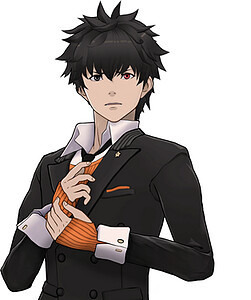
Margot Garcia Propaganda:
The entire story is told through her blog posts in which she details her "investigation" into two actors' personal lives. However, it's hard to know if she's telling the truth - much of her evidence comes from in-person anecdotes that no one can verify, leaving you to doubt whether any of it is real. Commenters are constantly trying to figure out her identity, many accusing her of lying. She eventually confesses that she had personal history with one of the actors and wanted to expose him for money laundering over a fandom grudge, and while the conclusions she reached were true, her methods and sources were often fake. (This part is Ending Spoilers so you can remove it from the propaganda if you want. idk) An anonymous comment later theorizes that she constructed a false narrative to frame him for murder, having done the deed herself
Kuruto Ryuki Propaganda:
Okay this is HUGE spoilers for the game like HUGE HUGE spoilers so beware. Like, the whole game will be ruined for you kind of spoilers. He is one of 2 (technically 3 (again, spoilers)) narrators in the game. Not only are certain important events left out if his side of the narration, but also (again huge spoilers) events are not told in the correct order. Each day in the game alternates between things that happen before the timeskip, and things that happen after the 6 year timeskip. (The other narrator(s) also have this same thing but I’m submitting Ryuki specifically) playing the game in the order it’s presented to you and playing the game with the events in chronological order are practically 2 different experiences
Ryuki is an extremely mentally ill man, whose issues are front and center as the player's first point of view character. The main twist of the game relies upon exactly his unreliability as a narrator, given that what we assumed was a series of linear events were actually scenes plucked from the past and the present, six years from what we had originally been led to assume was current time, and the only reason we hadn't realized it before is because his mental issues make him slip into a delusional state in which he believes himself to be in the past, or rather, that the past is the present.
Frequently has hallucinations of the world glitching out, often causing him to lose long periods of time and obscuring what really happens from the player. These get worse over time, causing a key suspect to be unrecognizable, and the return of a supposedly dead character to look fake. The game's twist involves seemingly linear events actually happening out of order--his warped sense of time contributes to hiding this. Events he thinks happened yesterday may have been years ago.
Don't want to be too spoiler-y but he can't tell what time period he is in sometimes, making the audience think he is in one time period, when in actuality he is in another one. Either way his narration makes the narrative like 10x more confusing.
#margot garcia#an unauthorized fan treatise#kuruto ryuki#ai the somnium files#ai nirvana initiative#Ai the somnium files nirvana initiative#aitsf#unreliable narrator battle#unreliable narrators#polls#side a
29 notes
·
View notes
Text
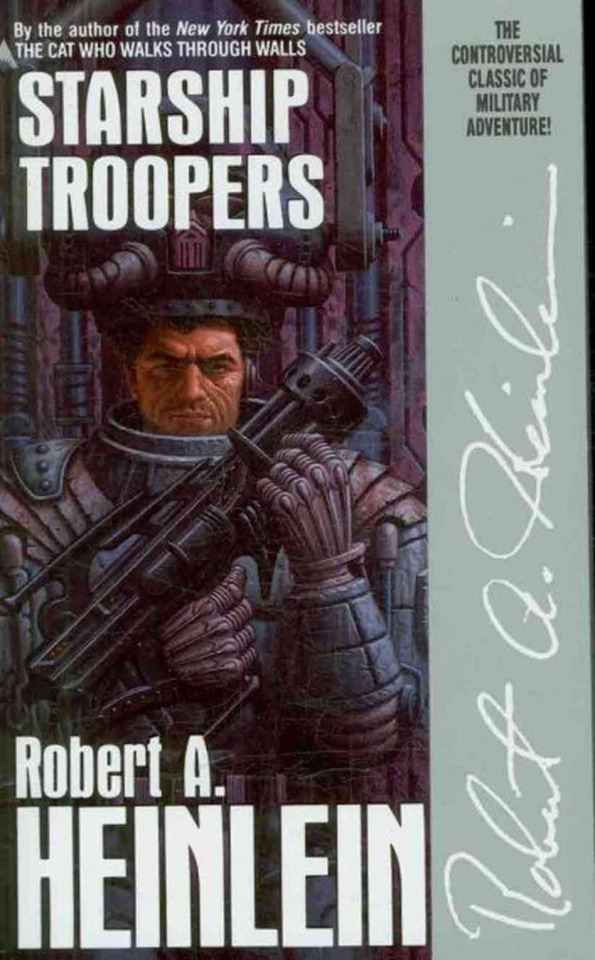
Starship Troopers is an interesting book (note: I said interesting, not good or correct), and I really think most people don’t know what it’s like.
If you haven’t read it, you probably have some idea of the shape of it based on 1) the movie and 2) the sheer volume of things that were heavily influenced by it (or heavily influenced by a work heavily influenced by it, given that the thing is over 60 years old and is retired with grandchildren now.)
You would be forgiven if you naturally suppose that Starship Troopers would have a lot of military action and alien fighting. It seems like a pretty obvious conclusion to draw. Hell, that was what I expected from Starship Troopers when I first read it as a teenager.
Starship Troopers is, at its core, Robert Heinlein conducting an extended thought experiment about morality and government. There are actually very few scenes of military action, much of the book is consumed by characters talking about how parts of their society (and especially the military) work to lay out an incomplete sketch of a “utopia.”
And the end result is pretty fucking wild.
Strap in, gang, this is a long one:
Our protagonist, who narrates the whole shebang in the first person, is Juan “Johnnie” Rico. If Troopers can be said to have a plot, it’s a coming-of-age story for Johnnie. The first chapter is a relatively exciting (if you enjoy Heinlein’s style) 20 page jaunt in Johnnie’s boots as a cap trooper: a power-armored soldier who drops from orbit with his unit to fight aliens. (The original idea from which MJOLNIR armor and ODSTs would come from is exactly this.) After that, we record scratch over to you-may-be-wondering-how-I-got-in-this-situation and go back in time.

Johnnie lives on Earth in the space future. He’s a rich kid on the cusp of 18. His parents expect him to start learning to be a good businessman, so he can one day take over for his father as head of The Family Business. (I don’t remember what The Family Business is, and I suspect Heinlein never bothered to tell me.)
However, there’s a flaw in this plan: Johnnie’s very best friend Carl has been talking to him about enlisting for Federal Service. Johnnie has never seriously considered it, and his parents haaaate the idea, but the thought won’t leave him alone. He goes with Carl, and when they encounter one of their classmates (a very pretty and smart girl, Carmencita) who wants to become a starship pilot (because Heinlein really thinks he’s really doing something with having only women be pilots because they’re naturally “better” at it) it cements the decision.
This is where we hit upon the foundation of Heinlein’s experiment: The thing about Federal Service in this world is that it’s the only way to become a full citizen with voting rights. Most people (like Johnnie’s parents) don’t think the right to vote is worth the effort and risk.
(I want to let you know an extremely funny spoiler: Johnnie's conflict with his father is finally resolved when, late in the book.... Johnnie's dad enlists in the infantry too because his son was a much bigger man for it and he is so proud of him now and Johnnie is so proud of his father and we are clearly supposed to be cheered and enheartened by this wild fucking reunion.)
Heinlein would later argue in an essay that he was sick of people assuming that Starship Troopers’ Federal Service is always military, but… That very much is the implication in here and I think it’s fair to read it that way. The 18-year-olds are met with a recruiting officer with multiple missing limbs, who has the job because it’s supposed to give them pause. He even tries to warn them off, but they’re all very sure.
(It's actually like, really funny to me.)
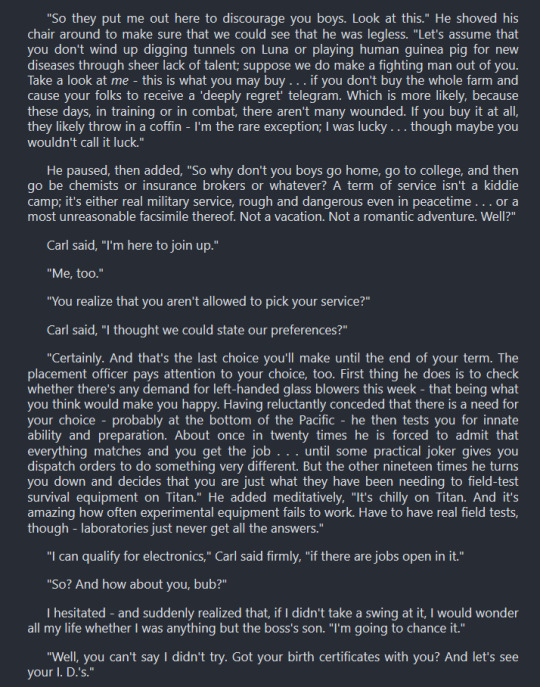
BONUS ROUND: the doctor that gives Johnnie a clean bill of health talking about how silly and stupid it is to go in for Federal Service, and some extremely 1950s science fiction verification of documents:
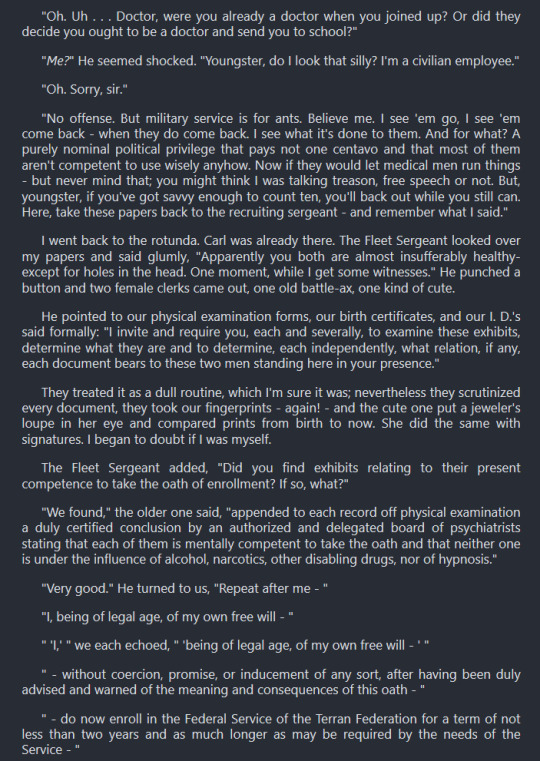
Carmencita is sharp enough that she’s probably a shoo-in for a pilot and Carl has zeroed in on working with electronics since he was a kid, but Johnnie has never been a particularly good student. He puts infantry down as his very least preferred option for service (you don’t get to choose, you see, but placement considers your preferences) but quickly figures out they’ve decided he’s unfit for anything else.
It’s okay, though! He can still back out! There will be no consequences… except forfeiting ever getting the chance to vote.
The first half of this book concerns Johnnie’s training to become a cap trooper in the MI (Mobile Infantry), which is intense and full of opportunities to quit and also we get to hear Heinlein talk about how public flogging (with an actual whip) serves a super important social function in this society.
There's a Big Fucking To-Do when one of the men in Johnnie's class successfully punches their drill sergeant, which gets him posted up for 10 lashes and dishonorably discharged.
The thing about that, however, is how it gives Starship Troopers the opportunity to have Johnnie overhear a conversation about it where Sergeant Zim is trying to get transferred back to a combat team because he is so ashamed of this as a personal failure:

Johnnie himself fucks up bad enough during training that he is also flogged, but he 100% believes that it was Totally Good And Justified And Fine so it's Fine.

The back half of the book has some of Johnnie in the MI, but most of all it’s about when he decides to go career and goes to officer candidate school and then the big mission that determines whether he gets to be a lieutenant or not.
Style-wise the book is an easy and approachable read, but you quickly figure out that many scenes boil down to an older, more experienced man (usually a flashback to his one high school teacher, later usually one of his officer school instructors) lecturing Johnnie about how the world works, why it does, and why that’s so very good. (All of these characters have pretty much the same voice.)
Here are what I understand to be the central ideas that hold up the roof in this book:
1. A human being is, by nature, a selfish short-sighted creature uninterested in anything but own survival, and strict discipline is necessary to train somebody into being a productive member of society. (It’s pretty much the same thing as the Christian “people are by nature sinful” thing but Heinlein managed to turn it around into a “scientific” evolutionary biotruth mess for himself instead.)
2. Corporal punishment is useful because pain is the most evolutionarily natural way for a human to understand that what they’ve done is a threat to their own survival, so switching children and flogging adults is a Good Idea Actually.
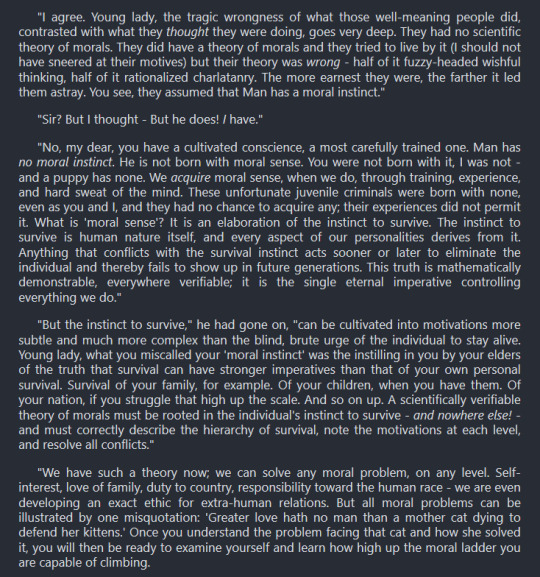
(Bob....)
3. In this fictional world, the government is good because the only people who vote are veterans. This isn’t because veterans are smarter or superior or impossile to corrupt, but because sweating out a term of Federal Service proves that someone is capable of putting the good of their civilization over their own safety/wellbeing and that proves they have the right, mature, moral character to help make decisions. Heinlein really, really, really wanted to tell the audience here that being willing to fight for your country (and the women and children!) was the noblest thing a human being could possibly do and he spent a lot of ink about that here.

(Bob Please)
4. Emphasizing that people have “rights” and not making them work for them coddles them and makes having rights meaningless, and also what about all those ne’erdowells that will use their rights to make bad selfish choices???? Clearly this system would be so much better.
5. All the people in the service are So Good And Noble because Heinlein’s magical space military is so super good at weeding out almost all the bad eggs during the selection process, and if anyone Truly Bad is in there it’s an unpreventable freak accident (that should properly be resolved via execution, and they’re willing to do that so It’s Fine.)
6. An officer is to be the best of the best of the best as a human being and all of the officers we see are EXTRA noble and good because they love their people SO much and it’s so hard to be an officer but they’re all SO BRAVE and SO SELFLESS and and and and-
7. Imperialism and unlimited expansion are Fine Actually because if you don’t expand, you’re going to be expanded upon yourself by somebody else so you might as well, and all wars are Actually just about population and need for territory anyway:

(Bob please I'm DYING)
8. The alien bugs are a pretty stupid analogue for communists because Heinlein was fuck deep in the red scare at the time. Mostly, they’re an implacable brick wall enemy that we get to feel zero remorse about because they are So Incomprehensible And Alien. Also, the whole rest of Heinlein’s super noble space military doesn’t look quite so good when they don’t have anything to fight/if we might feel bad for whoever they’re fighting.
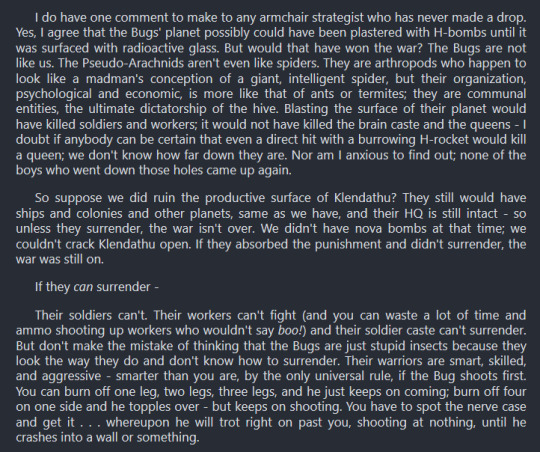
9. The best and happiest place for Johnnie in the whole universe is aboard his specific ship (The Rodger Young) with his specific unit (The Roughnecks) and every passage about his time with his unit between drops is dripping with yearning for this imagined perfect manly cameraderie. The death of his unit's Lieutenant hurts him worse than the death of his actual mother when the Bugs attack Buenos Aires.

But oh, Johnnie is definitely not gay, he waxes poetic about how beautiful and important and good women are at every mention, here he is talking about R&R on a safe planet and being Extremely Normal about the one guard posting on a ship where you watch the door to the part the female crew uses:

The main thing to know about Heinlein’s vision here in this book is that it is, of course, obviously completely bonkers. He clearly thinks he has figured people out and knows how human beings work. It's very earnest hard-sf white man nerd shit where he thinks that the problems of very large numbers of human beings are a puzzle you can solve if you put all the right pieces in the right place just so. He’s so excited about how he has invented this imagined future where women don’t face sexism and can do all kinds of jobs (while he clearly has plenty of sexist ideas about women on display) and people are not judged by their race. (Many characters, including Johnnie himself, are not white and there’s even a conversation where Johnnie and another character talk about how they both speak different languages with their families, and Heinlein is clearly convinced he’s writing a race-blind meritocracy, but also Heinlein does shit like compliment a Native American character by comparing him to his “scalp-hunting” ancestors like ???????)
Heinlein is so very wrong. He has a pretty poor theory of mind, which is easily evident because his characters are very samey and wooden. (I’m told this is pretty par of the course for him, and this matches what I remember of Stranger in a Strange Land. ) This extends to his inability to figure out why people do what they do, and his failures in that are how he arrived at these fucking buckwild conclusions. Is it any wonder his ideas about how to run a good society are fucked up when he’s operating from premises about humans being inherently selfish and the only possible reason to not just go along with The Rules is ignorance of their purpose?
Starship Troopers is dripping in rationalization. Starship Troopers desperately wants its military to be good and noble and necessary, it thinks that if it pushes around all the numbers of officers and men and arrangements of rules into exactly the right shape it can solve all the problems like equations and everything will snap into place and run perfectly and be totally moral and perfectly justified.
This is why this book was controversial, and why it launched decades of discourse in science fiction. The thing about milsf is that even if you hate Starship Troopers and want to read other milsf that hates Starship Troopers, it’s still in dialogue with Starship Troopers and the legacy of Heinlein.
I didn’t like this book for its content, I found it really interesting to engage with because of the connections I know it has.
BUT WE TALK ABOUT HALO ON THIS BLOG...
That's why we're here, so let me give you all a tour of various items of interest and relevance to our subject of hyperfixation here on bloodgulchblog dot tumblr dot hell.
Heinlein invented ODSTS:

The idea that has endured the most from Starship Troopers, more than any other (which is thankful considering what I've been talking about all through this post), is powered armor. Heinlein pretty much invented the space marine as a science fiction trope, and especially the powered armor:
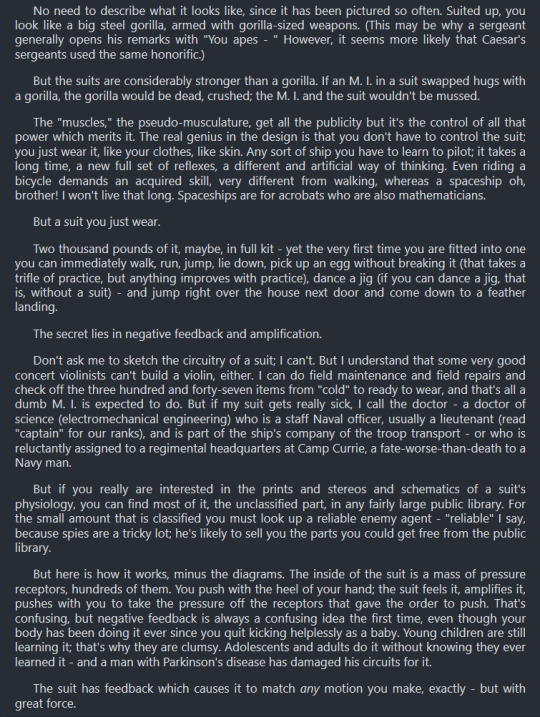
When someone talks about a "bug hunt" when it comes to fighting aliens in a scifi story, that terminology was born here.
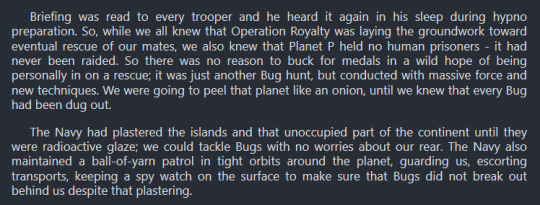
As you may have noticed here and in the section about Bugs: Heinlein's Terran Federation has the power to bombard planets with nuclear weapons to reduce the surface to radioactive glass, golly where have we seen that?
(See also in the bug section: a planet-cracking weapon called a nova bomb!)
Plus I would feel remiss if I didn't show you some of the naming scheme for some ships in this world:

...I'm not sure how to end this one.
I have a movie to watch, so I can finally comment on it. (The movie is controversial. Fans of Starship Troopers who agreed with Heinlein hate it, people who recognize how bonkers Heinlein's ideas are appreciate that the movie seems to understand this just as well. I need to go see it for myself. It's on archive.org if you spend 2 seconds hunting, if you also want to.)
I also have an anime to watch.
DID YOU KNOW THERE WAS AN ANIME?
youtube
This thing got a six-episode OVA released in 1988, right after Heinlein died and nine years before the live action movie. (It's supposed to be a lot more faithful to the novel, so I Will Report Back On This.)
Anyway: idk, if you also want to poke around in a weird dead thing, the full text of Starship Troopers is incredibly easy to find. It's less than two-hundred pages long. It will make you feel like you're taking crazy pills.
23 notes
·
View notes
Text
Monolithic Structures: Oppression in the Past and Present
(By Joriz Lowel Baje)
When a system of oppression manifested itself on the implication of different stakeholders with distinctive characteristics in our society, we found the principle of intersectionality not just in the premises of these injustices but in the time it covers. We then see that some issues share a common paradigm, which means that the oppression against women is also felt by white women, black women, and Asian women in the 80s or the 20th century. The discussion could then be saturated with one dominant interpretation of what struggle looks like even when it has different permutations over time.
This is very evident with the disparity of the American dream that has vastly escalated before, and Castillo has given justice to this discourse: to Filipinos who wish to migrate to countries like America. In the latter part of the narrative, Paz said, “... Constantly telling your daughter: If you were born in the Philippines, we would both be dead.” This speaks so much of how the Filipinos and other citizens of “third-world” countries go to America to alleviate themselves: America is the escape plan. America has been the escape plan, especially since the story's context touches on life in Martial Law, one of the most significant times of the Philippines’ political turmoil. It has been apparent that during the dictator's regime, many human rights violations happened: deprivation, killings, and illegal arrests, among others.
But this is not just isolated in retrospect, even in today’s time, there are a lot of struggles that pushed Filipinos to migrate for better opportunities, the lack of job opportunities, the continuing decline of the economy, and low salaries from a demanding job; however, without considering the struggles that may face in that country such as racism and discrimination. But what are racism and bigotry if you have lived from the day you were born to the time you left the Philippines as being exploited? People would instead go for the American dream—the green card.
This tells us that the past and the present share a collective struggle and that Castillo’s experience in Martial Law and her experience in love is a manifestation of the deep-rooted structures in our country. Nevertheless, it shows a certain ambiguity in the degree of our realities. It is astounding to think that the constant exchange of ideas in our society birthed various theories and conclusions. It is impressive to deduce an understanding of the theories of narration and witness its application in an actual narrative.
When we deduce society as a system full of oppression that manifested itself on the implication of different stakeholders in society, we understand that these structures of oppression encompassed time. As the long-time system enabled it, we still have to correct it through massive movements—this is our only hope. The collective struggle is essential to topple a structure that oppresses people on the ground. Mula noon, hanggang ngayon. Kailangan nating makibaka at lumubog sa masa.
PHOTO by Ian Peter Guanzon (2022)

3 notes
·
View notes
Text
The theme I chose for this assignment is embracing your youth. I am a big believer in you only live once, so accomplish all that you can in this lifetime! A big part of that is one’s youth/teen years. I constantly hear older generations wishing they could turn back time into their younger days. The teenage years are the ideal time to start a journey of self-discovery. This adventure needs to be celebrated and embraced since it is during this journey that individuals discover the tremendous power they hold. Youth is a time of exploration, of discovering one's self and one's purpose. I attached a variety of songs that are different genres of music which carry the theme of youth!
https://youtu.be/AbPED9bisSc
youtube
The first song I chose, my personal favorite, is called, Live While We’re Young, by my all time favorite band, One Direction. It is a little bit different from the rest of the songs as this song is more of a modern pop song. It is upbeat and describes the typical lifestyle of a teenager. The narrator of the song encourages a female to sneak out of her house all night long and pretend that she and the other person are in love by saying, "Tonight let's get some and live while we're young." When you're young, you don’t often think twice, and if you're not careful, you can have to live with the repercussions for the rest of your life.
https://youtu.be/mwG6g5boyF4
youtube
The second song I choose is called, Forever Young, by Rod Stewart. This is a rock song from 1988 which expresses a sincere yearning for a loved one to have the best in life, from making the correct decisions to having the appropriate outlook and spiritual guidance. In spite of how old they are, it is hoped that they will always retain the beauty of a youthful heart.
https://youtu.be/b7k0a5hYnSI
youtube
The third song I choose is a very popular song called, Unwritten by an artist named Natasha Bedingfield. This is an uplifting pop song from 2004, and basically says that your life is yet unwritten, or a blank page. She wants you to look inside of yourself and discover who you want to be. Remember that you are the creator of your own life story and fully accept your roles in it. The tone of this song is very hopeful and tells you to love a life full of possibilities.
https://youtu.be/fMMNrth246k
youtube
The fourth song I chose is called Young Blood, by Bea Miller. This song has more of a dark melody as the way it sounds in the beginning is very gloomy like. The song asserts that although youth might disobey rules, challenge authority, and forge their own path, they must persevere through difficult times. Today's generation may create their own luck and find strength in one another as they rewrite tomorrow because they have the energy and determination of young blood coursing through their veins.
https://youtu.be/nPYRBsGMKOU
youtube
This next song is called Sixteen and was written by Thomas Rhett. It is a country song that was released back in 2017. The narrator remembers how impatient he was to mature as a teenager. When he was only beginning to drive at age 15, he couldn't wait to get his license. But after turning 16, he eagerly anticipated turning 18, which would grant him a Saturday night without supervision or a curfew. But once he turned 18, he wanted to be 21 to legally be able to drink. Now as a grown adult, he came to the conclusion that he spent most of his time focused on what was to come instead of living in the moment.
https://youtu.be/TZNIKZdoehE
youtube
Finally, the last song I chose is, You Make Me Feel So Young, by Frank Sinatra, who happens to be another all time favorite artist of mine. This song is a Jazz Classic released in 1956. He writes about how he is confident that this woman will keep him feeling young at heart even when they are old because they run, sing, and play games together like a pair of children. Jazz music gives off more of an optimistic feeling. The tempo is moderate so it keeps a happy vibe throughout the song in which I love very much.
1 note
·
View note
Text
Health education and its importance (with reference to health education in pre schools)
Do you remember your life pre-covid? Do you remember when your children used to tell you different incidents and narrate stories to you when they came back from the day-care? Well, speaking on behalf of the entire staff and support staff at Ipsaa day-care, we too miss our children and having to share our moments of joy with them daily. Let’s all hope we see each other again soon in good health!
Talking about health, I am sure that as parents, most of you have guided your children towards the importance of washing hands. Whether it’s singing “happy birthday” during the hand wash routine or just talking to your child about the importance of washing hands, good health or health education is not only linked to washing hands: it also includes eating right, keeping yourself hydrated and exercise.
When a child comes to the center he/she is exposed to the world outside their home. The child must be on their feet and see for themselves what awaits them in their world called the “day-care”. As a pre-school; our topmost priority is making the day care healthy for the child to be in and to explore. In times like covid, it is imperative to plan ahead for our children and their futures in the day-care. Inculcating a routine in the center will not only make the child pick up the good habits first hand but also learning by doing. Good habits and cleanliness routines have always been a part of our curriculum. Now more than ever, we feel the base of all that we do in the center is cleanliness. A proper sanitized center that complies with all the health guidelines will never face difficulty in its functioning and as a result the children will be happy and safe. Currently, if we focus on the need of the hour then we will also come to a conclusion that we need to focus more on good health habits rather than just the teaching learning routine.
Let me point out a very important thing here, none of us are healthcare professionals but because we work in a field where we are responsible for our little ones, abiding by the correct norms is always seen as the most important step for us. When the children come back to the centers they will be told about the importance of staying healthy especially during these trying times. We must not forget that the children are too young so burdening them with excess information may also work in the reverse for us. At a primary level, the children coming to us in our centers spanning across India, should be treated with utmost responsibility and care. A curriculum that has all the important guidelines to leading a healthy life should be mentioned clearly and with defined principles for the teachers to teach the children. These children should be taught about the importance of health through different rhymes, stories and fun activities. As we all know that the children have hardly enjoyed any physical activities because they have been inside their homes for this long, we ,as a pre- school, must try to integrate health education with physical activities. By this I mean having the children engaged in different activities that will keep them busy and make them enjoy the day-care more. Sensitization begins at home. Since many of you parents are already doing this at home, we must take it forward from there in our centers. The right download for our teachers will work in the betterment of the children as well. Before, a specific and broad subject like health education was given importance but it was not the base of everything. Now, the teacher must take notice of the number of children who will play together, the toys they play with and the children to play with their own toys.
https://ipsaa.in/
0 notes
Text
Henry’s Forest - Huge Fudge
Or, “This episode is bad and it should feel bad!”

Season 3 in general is contentious to me. I can very much enjoy the music and visuals, and some of the episodes are pretty strong. However, a lot of the episodes are also very weak, partly cause they’re adapted from Magazine Stories (which can have cute ideas, but are very much written Simplistically, for Babbies) and partly cause they can show a flippant disregard for the realism that the RWS and first two seasons thrive on. There’s also an issue with characterizations, as attempts to develop sometimes misfire horribly and yet, plant the seeds of Flanderization that later hangs heavy over the cast.
Henry’s Forest is pretty much the ultimate example of the dark side of s3.
And yet, to others, it’s the Crown Jewel?! How come??
Well, I think it’s because it gives Henry what would become his Fanon Trait. His “Thing” that became a given, a foregone conclusion about him when looking at his character.... even though there’s not even a scrap of basis in the Books.
Henry is, apparently, a nature loving tree hugger, all because of this episode. And while I don’t hate the idea itself, I hate that it came from such a shoddy, overhyped, underbaked episode.
--
--
The Writing.... is so bad. The way you’d hear fans talk about it, it’s a nuanced dive into Henry’s psyche and appreciation of nature. It’s really not.
The syrupy narration tells us that Henry feels Very Happy there, that it’s Peaceful nature makes him calm..... but outside the short scene aesthetic hotspots showcase at the beginning, it’s not shown. It would have shown much better contrast if he was in a mood prior, and then his spirits lifted once in said Forest, but he’s grinning like an idiot for the whole section.
They also neglect to mention anything about the infamous Rule 55. I’m gonna hafta be a Purist here, and say that was a catastrophic blunder. And it’s a bit baffling, cause it would have taken one line, a few mere moments to say something like “Henry’s driver called ahead to get clearance and they settled on a siding.”, which may not be 100% Correct Procedure, but gives much more lip service to the understandable rule in place.
And, of course, the mere fact that the trees are positively looming over the line, huge and mighty, where their roots could reach under the rails and rip them up! If the section of the line being overgrown was commented on, as like, a neglected section that only got opened for use for plot reasons, it’d be better, but instead it’s treated as a normal section of the railway. Y’all seen the recent real life news stories where neglected parts of the lineside growth causes horrible crashes that tear the modern train up like tin foil??
Now, the episode kind of portrays the trees as indeed being a bit problematic, cause a strong enough storm rips half the trees up.... except the episode doesn’t comment on those trees now being a much bigger issue, all over the line as they were, it’s more “Henry Sad :C” and “Toby Sad to see Henry Sad :C”
And yeah, we’re given the odd plot shift to now focus on Toby instead, who has no real relationship with Henry, as he’s excited to help with the planting of new saplings (NO, YOU FOOLS! NOT THERE!!). And then Angelis has to recite the most retch inducing, nauseatingly sugary “Now everything is good again because the trees are growing and animals and children are playing and laughing and birds and shit” hrrRRRGGGGHHH
--
--
I do, however, come not just to critique the molasses out of this episode, but to offer notes for improvement.
This could have been a good episode if they’d actually done the revolutionary concept of focusing on a character and exploring them through the forest as a framing device. By which I mean, Henry and just what it is about the Forest that brings him serenity.
Like, the most I can extract from the episode as it’s given, is that he was there when the trees were (stupidly) planted in the first place, and that it’s a peaceful location. Urgh... so, like...
I agree with all of Awdry’s complaints bar one, and that’s [obviously, if ya’ve read my work? maybe? lol] that he doesn’t like the idea of the Locomotives themselves enjoying the scenery. Sorry, Guv, but that’s just a bit daft! You give ‘em such rich personalities but you wanna stop before they enjoy things? I can’t go for that, man! Again, I’m with you on your other objections, but it seems very natural indeed to me that they’d react to the locations’ aesthetics.
So! What does that mean for giving Henry some much-needed Character Points [as his main Arc prior had been the Illness thing, which isn’t a personality trait in of itself and has also been fixed forever] ? Well, I see three viable alternative routes, where there’s even some overlap! These are:
Henry enjoys the peace and the quiet all the more than other Engines due to his past difficulties and the sometimes hostile working environment, combined with the strong, wacky personalities of his Engine Coworkers. Trees don’t fuss, or boast, or ask annoying questions. Trees have sounds of their own, but quiet, subdued, distinctly different. Speaking of which...
He finds the trees bemusing and is drawn to them as a result. Trees ain’t much like a locomotive; they’re vertical instead of horizontal, and grow from something utterly tiny over many years, instead of being drawn on blueprints and made (ideally) the final size right out the gate! Trees are solid wood, and Engines are semi hollow metal, fed by fire and water. The contrast fascinates Henry, so he likes to just sit with them...
In contrast to but not mutually exclusive with the previous point, he instead sees the things in common! Huge, mighty things, coloured green, capable of such power but confined to where their roots or their rails lay... and odd kinship, but a valid one.
Yeah, they coulda touched on any of that and suddenly the many Fanon-isms about Henry retroactively make sense! But it seems what everyone’s done instead is to project similar ideas and then convince themselves that it came from the episode, giving it far too much credit in the process.
This pathetic missing of such a good chance, plus the awful “moral” of the episode (look, I’m a big Tree Enjoyer irl, but you can’t use a Trees Good lesson where they’re actively dangerous and out of place!) make me really mad. On the upshot, The Trouble With Trees in s5 exists, which does address the danger aspect and even has Henry himself tell James that there’s some forestry management happening. But alas, Forest has still got all too good a reputation, hence my long and rambly attempt to deflate it a little here.
Thanks if ya read all that! My next TTTE post may be less salty, hahah ^^;
50 notes
·
View notes
Text
Ayo anyone wanna see my essay on why removing Anybody Have A Map made the Dear Evan Hansen movie worse? It is slightly long
Disclaimer: I did like the movie (I cried three times), but I think they made some stupid decisions with it.
Dear Evan Hansen movie + musical spoilers under the cut, plus a fair amount of DEH neg/crit
Instead of Anybody Have A Map, they just have Evan's mom say "Hey are you writing those letters to yourself? Also you should ask the kids to sign your cast" before he goes to school and sings Waving Through A Window. They ignore every other part of the song and quickly insert the only thing from the song that's absolutely needed to understand the story so Evan can go be angsty at school. We don't even meet the Murphys until they meet Evan in the principal's office to tell him about Connor.
Disclaimer part 2 electric boogaloo: I complain about Evan a lot here. It's not because I think his experiences aren't valid and it's not because I'm trying to demonize people with mental illnesses or something. I know that his own struggles influenced his bad decisions. That doesn't mean they weren't bad decisions. He still did shitty things and he wasn't justified (listen to Words Fail), but I know it was influenced by his mental health.
On with the complaining!
First of all, the movie opens with Waving Through A Window? It feels like they're putting the most popular song first as a desperate grab for your attention to convince you the movie is good and like... they really didn't need to do that. Waving Through A Window is right after Anybody Have A Map, it's not like anyone's gonna walk out of the theatre after one (really good) song.
Anybody Have A Map establishes a few things: it shows us that both of these families are struggling so that we know immediately that the Murphys' perfect facade is fake, it shows us that Connor was a dick to his family (this is very important), and obviously it tells us why Evan was writing letters to himself. It also introduces us to the two main families at the same time so we know this story isn't just about Evan.
By starting the movie with an Evan solo song instead of the group song, they frame Evan as the one main character, the only person whose perspective we need to understand. But Evan is incredibly flawed, just like everyone else, and by making us think the story is only about him, it immediately makes us (the audience) more inclined to believe that Evan is always in the right and less inclined to consider everyone else's side of the story. Evan is an incredibly unreliable narrator, he's always going to frame his actions as correct, or at least excusable, even when he's actively hurting/lying to other people.
All of the Murphys get introduced through interacting with Evan instead of interacting with each other. This makes it seem like the Murphys only exist for Evan, but the entire point of the climax is that everything doesn't exist just for Evan! Evan is not part of their family, he can't just use everyone around him for his own benefit, and all of the Murphys have lives outside of him. When they're introduced through Evan, they're introduced as existing for Evan. Anybody Have A Map introduces them separately from Evan instead of attached to him.
Without Anybody Have A Map, we never actually see Connor being mean to Zoe, so she just looks like an asshole for not being sad about her dead brother. To make up for it, she's constantly having to tell the audience why she hated him, tripping over herself to talk about all the shitty things he did to her because we don't have Anybody Have A Map to show us their interactions. Zoe ends up complaining about her brother the entire time, so when it gets to Only Us and she says that she doesn't want everything to be about her brother, it seems out of character for her.
And with the removal of Anybody Have A Map, we don't ever see Connor interact with his own family in the movie. Anybody Have A Map is the only time we get to see Connor with his family. It shows us that Connor really was an asshole to his family, it justifies Zoe hating him, and it gives his mom more dimensions by showing her struggling to keep her family together even with everyone fighting against her. Without that, the writers ended up ignoring the most basic piece of writing advice - "show, don't tell" - to fill in the missing information from the song.
In the movie, all we get of Cynthia Murphy is... her being sad about Connor and refusing to admit that he ever did anything wrong. She's just boring and annoying in the movie, but in the musical, we get that bit at the beginning that shows her as an actual person with actual motivations! By cutting Anybody Have A Map, they made her into a more one-dimensional character.
So in a bit of a conclusion: Anybody Have A Map establishes the Murphys as main characters separate from Evan and shows us Connor's relationship with his family instead of telling us about it. It sets the scene for the story before just jumping into "Evan is sad and alone uwu anxious depressed soft boy" and makes everyone a better, more three-dimensional character. Getting rid of it meant that they had to do backflips to justify everyone's decisions during the movie instead of setting everything up at the beginning.
I do think the movie could've benefitted from Disappear but then again, it could've benefitted from the whole "Connor being the visual/vocal representation of Evan's justifications for why keeping up the lie is helping people" thing in general, but they got rid of that so Disappear wouldn't have worked. (I am salty that they got rid of that thing but whatever) The Anonymous Ones worked instead and it was a good song, so sure, why not I guess? /neutral
I could also complain about how they got rid of To Break In A Glove, Disappear, and Good For You, but none of those decisions actually impacted the story too much. To Break In A Glove and Good For You both got replaced with some tell-not-show cutscenes that gave us the same information in a less interesting way (and Larry got less character development without To Break In A Glove), and Disappear got replaced with an Alana song which was honestly pretty good so i'm fine with that one.
Now for some good changes that the movie made!
The Anonymous Ones was a good song, I actually really liked that. I'm disappointed that they got rid of Disappear, but they replaced it with another song that served the same purpose while also giving Alana more screen time and character depth! And it was a genuinely good song, I really enjoyed it and it made me like Alana more!
I really liked the ending of the movie. In the musical, there are literally no negative consequences for Evan, Zoe even forgives him at the end. She fucking forgives him for lying to her entire family about their dead son and and taking advantage of them because it "brought them closer together". And the internet never finds out what he did! He does all this terrible shit, lies to the entire fucking world, and gets away scot-free. And he never learns anything real about Connor. The movie changes all of that.
Connor's song was also a great addition! Every time we saw Connor in the musical, he was either being a dick or he was a fantasy version of himself made by Evan and/or Jared. Seeing that Connor can, in fact, be a nice person, that Cynthia's belief in him wasn't misplaced, was so satisfying. He really was just a meaner version of Evan a troubled kid lashing out at the world in self-defense. He wasn't an entirely bad person.
The Murphys still decide not to tell anyone what he did, but then Evan decides (on his own!) that he needs to own up to what he did. He records a video of himself admitting to what he did, shifts all the blame to himself, and then goes out of his way to fix his mistakes in any way he can. He says that his biggest regret is not getting to know Connor while he had the chance, so he goes online to find anything he can. He reads Connor's favorite books, tries to find anyone who might be able to tell him what Connor was like, and when he receives a video of Connor playing his song in rehab, he takes the time to send the video (through the mail, on a flash drive) to the Murphys, Jared, and Alana.
Evan doesn't contact Zoe at the end, she contacts him instead. She doesn't forgive him, and he doesn't ask for forgiveness. He knows what he did was wrong and he owns up to it and tries to fix it as much as possible, knowing full well that it could ruin his life. He does the right thing for the first time in the entire fucking movie (that's hardly even an exaggeration) and it's such a good ending. It makes more sense and is more satisfying than the musical.
The Dear Evan Hansen movie was not nearly as bad as the reviews say it was. It wasn't as good as the musical, it had its own problems, but it also made some good changes that I think made the story better. It wasn't perfect, but I enjoyed it and most movies aren't perfect anyway. It really could've benefitted from Anybody Have A Map, though.
#the first draft of this took 50 minutes to write and it was on discord#then i spent a solid hour editing it while at work#please appreciate me /hj#pie.txt#dear evan hansen#dear evan hansen movie#dear evan hansen musical#dear evan hansen review#evan hansen#connor murphy#zoe murphy#cynthia murphy#larry mora#alana beck#i tagged a post for once now give me clout#/j /j
54 notes
·
View notes
Text
Thought Experiment
I can’t take it anymore. This is for Athena Dark. I’ve even unblocked you so you can answer. I have certain questions about the way you see the show.

ALAN DEATON, SINISTER MASTERMIND: Let’s say you are right. Alan Deaton pulled the strings throughout the series. He was the Puppeteer to Scott’s Puppet. He manipulated events concerning the Nemeton and he manufactured Scott’s rise to True Alpha. In terms of your analysis, please answer these questions:
What was his primary goal? If you believe that he was manipulating things behind the scenes, you have to believe he had an ultimate goal. What was the payoff that he was heading for?
Why didn’t he take out those who could oppose him? For example, why didn’t he eliminate Stiles or Derek when he had them at his mercy?
What was the point of turning Scott into an alpha with tree magic or pain drain or stealing Derek’s alpha powers rather than simply having Scott murder Derek in Master Plan?
Why didn’t any of the actual protagonists figure out what he was doing in 100 episodes?
What was the goal of the production in concealing Deaton’s role as villainous manipulator and beneath layers of symbolism and misdirection, yet never revealing it directly to the audience?

SCOTT MCCALL, ULTIMATE VILLAIN: Let’s say you are right. Scott McCall was a self-righteous inquisitor, a self-appointed white knight, a tyrant and an abuser. Other characters only followed him out of fear or pity, and he did more harm than he helped. Let us say your estimation of his worth is completely correct, please answer these questions:
Are you arguing that Scott was so powerful that no one could have overthrown him in 100 episodes? Stiles wasn’t smart enough to figure out a way to defeat him? Derek wasn’t brave enough to face him? Peter, Gerard, and Kate weren’t ruthless enough to take him down?
Why did Scott, as an abuser and a tyrant, never seem to be able to punish those who did oppose him? Peter ended up free, rich, and with a new daughter. Derek regained his family and came and went as he pleased. Stiles joined the FBI and left without any harassment by Scott. Theo ended up free and on his way to being happy. Gerard wasn’t killed by Scott but by Kate. Monroe got away. As an inquisitor and a white knight, whom did he successfully and unlawfully punish?
Who should also be held responsible for enabling him? Of course Deaton must be held responsible. Melissa? Noah? Derek? Lydia? Liam? Stiles? Malia? All of them helped him and even saved his life from time to time. Who among them shares the blame?
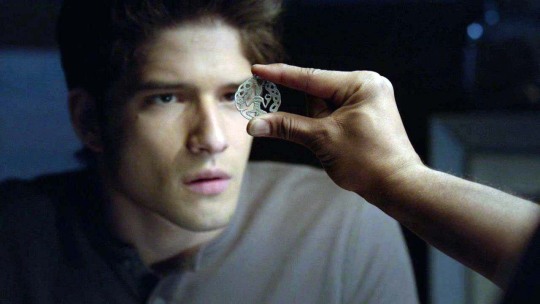
SCOTT MCCALL, UNRELIABLE NARRATOR: Let’s say you are right. Everything we see on the screen is through his eyes and he twists what really happened to support his personal view of himself, but the real truth can be seen by what he doesn’t say.
Why would he include scenes in his narration that made him look bad, like his violation of Corey, his screw ups with Allison, his doofus mistakes with Derek, his lying to Kira? If this entire story was made up to make him look good, why include things that make him look bad? For example, why not, in relating the fight with Stiles in Lies of Omission (5x09), make it look like Stiles condoned murder rather than it be a simple failure of communication?
Are you saying that Scott is intelligent enough to include and create layered manipulations? When Peter told the story of Paige, Scott was able to create a fictional account of Paige and Derek within another fictional account of Peter manipulating Cora and Stiles? Or when Gerard told the story of Marie-Jeanne Valet to Lydia, Scott was able to twist that information into a plea for strategic unity?
What parts of Scott’s unreliable narration were actually true? We know you believe that every time Scott was heroic, it was him twisting the truth. What parts are actually true, if any? How can we tell?
TEEN WOLF AS A WHOLE: These three arguments above, if we take them as true, cast doubt on how most of us think about the series. If we take them as true, here are some questions that I can’t answer.
What are the themes of Teen Wolf? What conclusions are the audience supposed to draw from the show?
What genre is the show? It can’t be teen action-adventure and drama, because there is an expectation that the protagonist will succeed in such a genre. It seems a little light-hearted for existential horror.
Why did the production never reveal openly that Scott is actually the villain, that the narrative is all lies, and that what we think is going on isn’t actually going on? What payoff did the network and the production get?
Why in the three years since the show ended, has no one -- not Jeff Davis, not the actors, not the writers -- talked about the immense trick the show played on the audience? Why has Jeff Davis never talked about Scott’s ultimate villainy? Or any actor brought up the unreliable narrator? Why, three years after the end of the show, has not one person connected to the production addressed this secret truth?
Feel free to take your time with this.
65 notes
·
View notes
Text
My Roommate is an Apparition: WHAT A HORRIBLE NIGHT TO HAVE A DAD - Part 2
Based on characters created by @reddpenn
————————————-
Oh man, am I late on posting this. So many things going on. Not to mention figuring out how to follow up the first part.
It seems people really like the first-person narration from “A-Pink-Ciation of Culture”, so I went with that again with this piece.
Almost DAILY, I get likes or re-blogs and the occasional follower despite not having posted anything since March. I’m very curious and would like to hear from you readers about what you like about my writing and what appeals to you. Eventually, I want to make a living off of writing, but until that time, I definitely could use any and all feedback.
Anyway, now that that’s out of the way, on with the story!
From the Diary of Lily, March 1st, 2020:
Okay, diary, I’m coming to you because I honestly have no idea where else to go to try and sort through the evening I just had with my Dad and Tulpa. I can’t put my finger on it, but something about tonight just... bothers me! It’s like I’m on pins and needles and can’t stop thinking about, well, a LOT of stuff. Just... hear me out and maybe it’ll make sense if I put this all down on paper (I.E. You). I just spent the last twenty minutes trying to talk things through out loud, but that got me nowhere so here goes nothing:
First off, my Dad came to visit a week earlier than what I had planned, and immediately sets up shop in my living room with his NES and copy of Castlevania III. Only problem was I hadn’t talked with Tulpa about his visit since I was expecting him until NEXT weekend. I kept thinking that the last thing I wanted was for anything weird to happen during his visit.
Which, looking back on it, was a really stupid thing to worry about.
I mean, Dad’s a pretty open-minded guy and he’s quite weird himself. He’s actually quite proud of his weirdness (embarrassing as it is sometimes). He tends to under-react to all kinds of things like it’s no big deal. I’ve even asked him why he doesn’t freak out about some of the stuff he comes across in real life or on TV, and he just tells me, “I’ve seen weirder.” (If some of the stories he’s told me are true, then he has. He really, REALLY has!)
For example: if Tulpa had come into the room holding a... I dunno, a plate or something, like would that really freak my Dad out? Pfft, No! He (maybe?) wouldn’t see her, all he’d see was a “flying saucer” (he deliberately would make that lame pun too), and then get back to his game. Then later, he’d try and tell me about the real flying saucers he saw years ago, or something.
Since I had assumed that Dad wouldn’t have been able to see her, it eventually clicked in my head that what I was actually worrying about was, “what would Tulpa think of my Dad?” He’s a huge Goofus that likes to make bad jokes, tell tall tales, and play video games! And even if he did weird her out, it’s not like she could go anywhere... right? I mean, she might avoid interacting with me because of him, but...
Oh...
Oh wow...
I just read what I just wrote and I can not believe I was being THAT irrational! ( Man, people are stupid sometimes; me included!)
Avoid me because of my DAD!? That’s gotta be the dumbest thing I’ve ever thought! It’s not like he LIVES here or anything! He’s not the one paying the rent; I am! And... I’ve gotten to know Tulpa pretty well these past few months, but... I guess I still have a lot more to learn about her. Case in point:
————————————-
So Tulpa tells me that she wants to meet my Dad, and after coming to my senses somewhat, I say she can sit in so long as she doesn’t touch anything (see flying saucer explanation above). A few minutes later, she walks in looking like the tall girl from Keep Your Hands off Eizouken (I had to look the name up; I couldn’t remember it for the life of me). By that I mean, she’s coming in as a tall, lanky, skinny, somewhat pale skinned girl looking to be about my age. She’s wearing some modest clothes and, if I’m being honest with myself, they looked kind of cute in that outfit they had on. It was a nice ensemble.
Then Dad says “Hi” to her.
...
Let me repeat that in case it hasn’t clicked with you yet.
My Dad GREETED her!
He! SAW! Her!
When I asked her about it later, she said to me that she thought that since he’s my Dad, then whatever it is that allows me to see her could be something my Dad has too. So far, her theory has been proven right, but... I’m not one-hundred percent sure, because Tulpa... well... she changed.
And I’m being literal here, too! She no longer had that transparency to her like usual. She had a nose! She had ears! She had five fingers! And she looked...
...well...
...good.
Tulpa said she had never tried doing this before, but figured that in the off-chance that her hunch was correct, she wanted to make a good impression on my Dad. (Why do I keep thinking about that old joke in movies and TV shows about the overprotective Dad that threatens the boy about to go on a date with their daughter?) She even went so far as to create her own “clothes”, saying she knew they’d be important. Considering that she doesn’t wear (or need) clothes any other time, I ask her how she came to that conclusion. I still have no idea what she meant when she suddenly bellowed out, “GOOD...! GRIEF...! HE’S...! NAKED!”
[Edit: It’s from Spongebob, because of course it was.]
So I’m not sure if Dad could see her because she purposely made herself opaque, or if he would have been able to see her if she wasn’t in her human “disguise” (and yes, I’m calling it a disguise and I’ll explain why a bit later, okay?). But either way, she walks in and my Dad just starts chatting away like so:
————————————-
“Hi there! You must be Lily’s roommate!” says Dad.
At this point, I’m kind of frozen solid on the couch, just watching and listening as everything unfolds in front of me like it’s being burned into my retinas. You know that saying about slow-motion train wrecks? Y’know, about how you can’t look away from them? This is probably why I remember the conversation so well.
“Heh...Hello,” she responds back nervously.
“I’m Lily’s Dad,” he says as if it wasn’t obvious, “Hope you don’t mind if we play some games out here.”
Tulpa shakes her head and stutters out, “No...N-not at all.”
“Great!” Dad responded with a smile that said, “Even if it was bothering you, I’m still going to take up the TV and play video games. So nyeh!” I’ve lived with him long enough to know that he’s not someone who would give up the TV without a fight.
(...gee... that kind of reminds me of someone now that I think about it...)
Tulpa then asks, “M-mind if... I watch?”
Dad gives her this big, goofy smile and responds with a, “Sure thing!” since despite him never admitting to it, he always liked having an audience around when he played games (or almost anything really) in hopes of “schooling” them. (Why he didn’t go into teaching, I will never understand.)
As soon as Dad turns back to his game and un-pauses it, Tulpa smiled, sat back, and looked content (Although it was a little weird seeing her smile with a nose to go along with it.) This snaps me out of my stupor long enough to scootch over to Tulpa and chat with her.
“You actually want to watch him play?” I ask her once more because the mere thought that she’d be interested in something outside of cartoons still hadn’t registered in my head, yet.
“Yeah...” she says as she starts to stare at the screen like she usually does during her cartoon time. “...sounded... familiar,” she said before looking up slightly while lost in thought, “...Simon... Belmont... Mega... Man... Kid... Icarus...” she said again as though that meant something. To me it just sounded almost like some kind of madness mantra, but...
“Oh! You mean Captain N: The Game Master!” my Dad chimed in out of seemingly nowhere.
“YES!” Tulpa said with excitement (worth noting that she doesn’t look excited very often, but when she does, she practically glows). “I remember...” she said before pausing to collect her thoughts and form the words she wanted to say. If I could have, I would have warned her about my Dad’s tendency to pounce on any hesitation in a conversation to take it over.
“Man, I haven’t seen Captain N in decades,” he said wistfully, “Surprised someone young as you remembers it. I was in High School when that show came on! When did you see it?”
“Ummm...” she hesitated, “...reruns... when I was... a kid.”
(As I’m writing this down now, I realize she was trying to hide her actual age from Dad. She looked to be in her early twenty’s like I was, but if she said she saw it when it came on the air originally, that’d make her over thirty years old at least.)
“Ahhhh! I see you have good taste in reruns!” Dad complimented.
“Th-thank you,” she stuttered back. As I listened to the awkward conversation of father-roommate bonding, I found my eyes constantly turning towards Tulpa. Not out of adoration or anything, but more like... studying her.
————————————-
On the one hand, she looked like the Tulpa that I had known ever since she became my roommate months ago. But on the other hand, they somehow weren’t. It’s kind of like when someone changes their looks a bit for maybe, I dunno, a night on the town, a job interview, a wedding, or something else along those lines. Only in her case, “dressing up” meant adding additional body parts she didn’t normally have.
(To be honest, I’m still not entirely sure what to think about that...)
I’ve always been a firm believer of people being themselves, and being allowed to be themselves. I can’t stand situations where people are unable to truly express themselves or feel comfortable. Way I see it, life is too short to be spent worrying over stupid stuff that makes people miserable just so they can come off as normal.
Sometimes it’s because of social norms and expectations; those unspoken rules of life that people are supposed to just magically “know”. Like if someone was going to a church or temple service, social norms say they need to wear their “Sunday Best” with stiff, itchy clothes that are dry clean only. If I was able to go to a sermon wearing a baggy college sweatshirt, sweatpants, and slippers, and NOT be judged like I’m some kind of crazy hobo, it would have definitely made something like that more appealing to me.
Now I have nothing against anyone that likes to dress up in fancy clothes and wear them out and about; I mean, everyone likes different things, right? The point is that if I’m going to do something that makes me uncomfortable, it should be because I wanted to do it for myself. I don’t think I should bend over backwards making myself feel bad (physically or mentally) for someone else’s sake. Sure, call me selfish if you must, but I just can’t advocate for doing something that makes you feel bad because you wanted someone else to feel good.
I’m just thankful no one in my family has ever tried to push anything on me. Sure, they’ve suggested things to me before, and of course made sure I didn’t do something stupid that would injure me or worse when I was too young to know better. But overall, my family has given me a lot of freedom to do what I want, dress how I want, and be who I want to be. Now that I think about it, I’m kind of lucky that way.
(I hope I’m making sense on this. Re-reading this, I’m not entirely sure if I do.)
————————————-
Anyway, I’m looking at Tulpa and watching them carefully, trying to figure out if they were comfortable looking like that or not. She’s just sitting there watching my Dad play Castlevania III, and he was now on the haunted pirate ship with Trevor and Sypha. He was breezing through at a pretty good pace and sharing an anecdote about how Warren Ellis figuratively gave him the “Turd Cape of Shame” on this old message board back when the Castlevania series on Netflix was just an idea back in 2007. (I still am not entirely sure if that story is true or not.)
“Hey Lily,” Dad asks suddenly out of the blue, “got anything to drink?” I offer him some lemonade, he accepts, and I go to the kitchen to pour him a glass. As I’m doing this, I hear Dad ask Tulpa, “By the way, I don’t think I caught your name. What was it again?”
“...Tulpa...” she says back to him.
My body freezes up for a moment as I realized that “Tulpa” is not an ordinary name. I mean the first time she told me her name, it sounded like some kind of Pokémon. Once again, that irrational fear of my Dad being weirded out or something enters my head, but is dispelled almost immediately.
“Tulpa?” my Dad says aloud to himself, “That’s a very interesting name.”
“T-Thank you...” she says back.
I walk in with a glass of pink lemonade and set it down on a little, folding TV dinner stand that was given to me when I first moved out for college. I slowly sit back down again as I keep an eye on Dad. His facial expression is the same as usual: relaxed. You could call it a poker face, but I’ve seen him play poker and he is BAD at poker.
“Anyone in your family Buddhist?” my Dad asks casually.
I step in, “Dad! What kind of a question is that!?” And I meant what I said too. Who even asks something like that!?
“I was just wondering,” he says before once again shutting up and focusing on his game.
This is one of the things about my Dad that bugs me to no end: he likes to be cagey sometimes. He’ll say something vague with the sole purpose of making the other person curious, confused, or both. It leaves, like, questions in the back of your head that just start gnawing at your brain and won’t stop chewing away at your gray matter until you finally ask him to explain what the heck he was talking about. He does this on purpose to “bait” people into asking him questions or to continue with what he’s saying. So annoying!
I sigh, “Why’s that, Dad?”
He gives a little smile and continues, “Oh it’s just that this isn’t the first time I’ve heard the name “Tulpa” before, that’s all.”
NOW he has my total undivided attention and Tulpa’s too as we both unconsciously lean forward. Practically in sync, we both say, “It’s not!?”
He’s still smiling as he says, “Nope. First time I heard that name was when I was doing some monster research for a Castlevania Wiki I had been working on a while back.”
Tulpa practically gulps, “M-M-Monster...?”
“Well not really a monster,” he says back, “more like... a supernaturally, artificially created person.”
(There are some times when my Dad can be down right spooky and creepy. This was one of those times.)
Full Metal Alchemist immediately pops into my head, and without even hesitating, I ask, “Like a Homunculus?”
“Nah, more like...” he says before pausing his game and turning to Tulpa and I, “...an imaginary friend.” Tulpa and I both tilt our heads in confusion. Dad picks up on this and by now, he is practically glowing at this opportunity to share some weird thing he just happens to know something about.
He explains, “So there’s this word in Tibetan called “Sprul-Pa” which means “Manifestation”, okay? And in early Buddhism, this is used as the explanation for how Gautama Buddha could travel to heavenly realms and come back again. You could say he created a clone of himself in the other realm and then transmitted his consciousness to it from his body on Earth. Kind of like a-”
By now, Tulpa and I were clearly on the same wavelength as she asks, “a Shadow Clone!?” at the exact same time I was thinking of it. Believe it!
Dad’s silent for a moment as he thinks to himself before finally going, “...uhhh... I guess... you could say that. I was thinking “Dream Body” but I suppose a shadow clone could work too.” My Dad used to watch Naruto with me on Toonami years ago, so he knew full well what a shadow clone was.
He turns to face us as he continues talking, “The thing with a Tulpa is that it’s something made from nothing. A Homunculus, using your example, Lily, requires having the materials necessary to make an artificial being on hand before you can create them. But a Tulpa is willed into existence out of nothingness. It is created from the thoughts of the creator; known as a “Thoughtform” in some cases.”
(WHEN did my Dad even learn this stuff!?)
“The difference between a Tulpa and an imaginary friend,” my Dad continued to say, “is that while an imaginary friend is just that, someone that exists in your imagination, a Tulpa is made when someone’s thoughts are so strong that they will their imaginary friend into existence.”
I look over at Tulpa, and she is totally absorbed in what my Dad’s saying.
“Now from what I’ve read...” Oh my God, Dad! What have you even been reading!? “...it’s very difficult for one person alone to have enough psychic power to will a sentient being into creation. But if you had enough people thinking the same thing, and thinking about it hard enough, then, hypothetically, a Tulpa could be created.”
“So what you’re saying is if enough people think Bigfoot is real, then they can actually make it real just by believing in them?” I snark.
“Yeah, pretty much,” my Dad replies without detecting my snark at all.
“Or like...” Tulpa chimes in, “...how Tinkerbell is saved... by believing in fairies and... clapping hands?” I was a bit surprised Tulpa knew that since I couldn’t recall Disney’s Peter Pan having that scene in it.
Dad thinks about it for a moment, and then goes, “Hmmmmm... yeah! That too, I suppose.”
Right about then, Dad gets a notification on his phone. He pulls it out, looks at it, gets a somewhat serious look on his face, and then stands up and says, “Hey, I gotta make a phone call real quick. Mind if I...” he trails off.
“Yeah, sure thing, Dad,” I say back. He heads down the hallway to the guest bedroom and closes the door as he makes his call. It’s now just Tulpa and me in the living room, and we were both feeling super awkward. I turn to Tulpa and say, “So... did you know anything about all that?”
Tulpa shook her head, “N-n-no. First time I... I ever heard of... of it.” I could tell she was feeling nervous. She had started stuttering pretty badly.
All this time, I knew Tulpa was an apparition, but I never thought about what kind of apparition she was. It never really dawned on me that an apparition could have an origin story. With Tulpa, she was just... kind of there for me, and I never really questioned it. Her being her somehow felt, I dunno... “natural”, I guess.
I never thought I really needed to learn more about Tulpa, anyway. I mean, outside of the occasional mischief, Tulpa was perfectly harmless. Worst thing she ever did was the Pinkening (still don’t know how she did that), but that was partly on me because I was being a big dummy. Overall, she’s always been friendly, kind, and fun to be around, and that‘s always been good enough for me.
“You, uh...” I start to say, “...want to talk about it later?” Tulpa looks ahead of her kind of blankly, and I immediately add, “It’s okay if you don’t want to, Tulpa, I just-“
“Talk about what?” She asks, now looking at me kind of confused.
“About...” I trail off as I try to find the right words, “...about what my Dad just said and about... I dunno... where you came from?”
Tulpa clearly hadn’t thought about it before. She leaned back against the couch and audibly sighed (I think that was the first time I ever heard them sigh!), before saying, “I... don’t know... Lily...”
“Don’t know where you came from, or don’t know if you want to talk about it?” I asked her.
She thought for a moment before saying, “Both...”
I wanted to say something more to her, maybe give them some kind of reassurance, but I just couldn’t as long as my Dad was here! The frustration of wanting to talk about something with someone, but not being able to because of other people being around, is just AGONIZING! If only Dad would hurry up and leave, but when he says he’s going to beat a video game, he’s going to beat a video game. Problem was he hadn’t even made it to Dracula’s Castle yet, so who knew how much longer it would be?
Then Dad comes back in and says, “Hey, sorry about this, but I need to get going.”
HAAAAAALLEJUAH!!!
“Oh sweet merciful powers that be, THANK YOU! “ I thought to myself. I was worried things were going to get all cringy like a bad self-insert fanfic. “Aww, that’s too bad,” I fibbed out of politeness. I mean, he’s my Dad and I love him and all, but... y’know...
“Yeah, I got a call from work and they need me to help out with something. ‘Fraid I have to cut my visit short, Lily.” My Dad powered off the Nintendo system and began packing it up. But then he suddenly stopped, looked up, then looked back at me and said, “Hey, you want to borrow my NES for a bit!?”
Dad suddenly leaving to take care of something for work happens every now and then, so that was no big surprise. But Dad suddenly saying he has to leave to take care of something and leave his NES in MY care!? THAT scared the pants off me!
“Oh my God, Dad... you’re not dying are you!?” I ask with a half-serious tone.
“What!? No! What gave you that idea!?” He shoots back.
“Because that’s the NES you’ve had ever since you were a kid! You have NEVER let anyone else look after it! EVER!” I remind him because it is one-hundred percent true.
His lame-sauce excuse was: “Hey, both of your uncles used to look after it!”
And then I remind him, “That’s because you all lived in the same house with grandma and grandpa! Y’know, because you were all kids and everything!”
“They still took care of it,” he pouts.
“Only after they sneaked into your room, de-hooked it, and snuck it over to their room! You know I’ve heard the stories at the family gatherings!, right?” This is all completely true.
————————————-
My Dad is the oldest of three, and at family gatherings, like around Thanksgiving, he and my uncles used to tell as many embarrassing stories about each other as possible like they were trying to one-up each other. Like, “Hey, remember that time you stuck a LEGO tire up your nose and had to go to the Emergency Room?”
And my uncle’s all like, “I WAS FOUR!”
Good times....
...now where was I?
Oh right! Why leaving the Nintendo was a big deal!
————————————-
“C’mon, Dad,” I plead, “The only way I can see you willingly giving away your Nintendo, even if just for a little while, would be if you were on your death bed and filling out your last will and testament. So go on, spill it, what’s up with that?”
My Dad just had this look of offense on his face like I had seriously wounded him with my words. “I am NOT that overprotective of it!”
“Yes you are.”
“Okay, I am,” he admits way too quickly, “but I just thought that you having it might be a good idea in case you finally get some free time coming up. Best way to enjoy it is to play it, after all.”
I chuckle, “Dad, the only way work is going to give me enough time off to sit on my butt and play video games is if some horrible catastrophe caused the art store to shut down. Like, I dunno, a deadly virus or something.”
[EDIT, APRIL 12th, 2020: ME AND MY BIG FAT MOUTH!
AAARRRRGGGHHHH!!!]
Dad chuckles and say, “Yeah... you got a point there. Still, I think between you and your roommate, you’re both responsible adults now who can get some enjoyment out of it. I’m sure I can trust you two to take good care of it,” he says before raising an eyebrow, “or is there some reason I shouldn’t leave it here!?”
“Relax! We can look after it, Dad. Nothing’s going to happen to it,” I say as I whip my head back so fast it could have made a sonic boom. Just as I suspected, there was Tulpa sitting down in front of the Nintendo about ready to poke it with her finger. “Isn’t that right, Tulpa?” I say while looking straight at her.
“Y-yes...” she mutters.
Dad smiles at the two of us and then suddenly, out of the blue, he gives me this big ole bear hug and pats me on the back! It’s the same kind of hug he gave me on my first day at school, when I was leaving for summer camp, and when I moved into my freshman dorm for college. It was the kind of reassuring hug that says everything is going to be fine. “Ohhhhhhh, look at you growing up and being all responsible! I’m so proud of you, Lily!”
“Dad! Can’t breath, Dad!” I say before he finally lets go.
“Oh yeah, tomorrow, when you get a chance, make sure to pick up a couple packages of toilet paper,” he says casually, “your bathroom’s running low and now would be a good time to stock up.”
[EDIT April 12th, 2020: HE FREAKING KNEW!
HOW!?!?!?]
“Thanks for the tip, Dad,” I respond before saying the thing that led to my Dad saying the other thing that would make my brain do somersaults for the next few hours and ultimately come to you, dear diary, “What brought up that little nugget of wisdom? Dad-ly Intuition?” (Yes, that pun was intentional.)
“Well I’ve always considered myself to be a little psychic here and there,” he says about twenty-three seconds before the door closes and forty-five seconds before my face faults, “and you’ve always been a little psychic too, haven’t yah?”
“Sure Dad, I’ll catch you later,” I say waving goodbye.
“Take care, Lily! Keep in touch! Love you, sweetie!” he calls back as he’s walking into the hallway heading out,
“Love you too, Dad” I say as I close the door and lock the deadbolt. With that family obligation out of the way, I was feeling much better not having to worry about next weekend, not having to worry about Tulpa and Dad, and could just chill and relax and-
It was right about then that my eyes shot wide open as I stared ahead of me at nothing in particular. The gears in my head started turning faster and faster as the past few months living here started to tie together. Tulpa looks at me, slightly concerned. She’s still in her “disguise”, but looks genuinely concerned. She waves her hand it front of me and my mind is working at warp speed, so it doesn’t even register.
“Are you... okay... Lily?” she asks.
I slowly turn to look her in the eye, and then ask her flat out:
“Am I Psychic!?”
627 notes
·
View notes
Text
OTGW Dream-Unknown Comic Lore
Hey! Thought I’d make a post about the “ongoing” (now finished) post-series OTGW comic and the implications it has to the lore of the show, since I’m not sure everyone has read them.
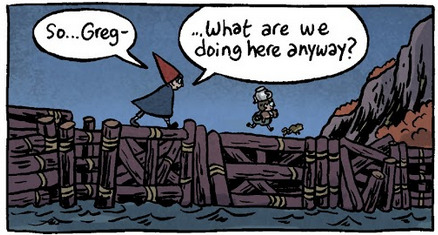
Big Note: these comics are only dubiously canon! None were written by Pat McHale.
Other Big Note: I think assigning hard “mechanics” to how the Unknown works defeats the purpose. It is mean to be loose, fairytale like, shepherded by emotion. Putting a stamp on “this is how they get in and out” and “this is exactly what happened” doesn’t make sense -- part of the point is we, Greg, and Wirt don’t know exactly what the Unknown is.
That being said, i still think it’s fun to look at the facts presented in the comics and see if we can figure out a bit of what’s going on. This post is long because this is who I am as a person, apparently.
TLDR: Wirt and Greg can be brought to the Unknown during their dreams, potentially for multiple days in one night. They are there until they both realize they are dreaming and they solve the problem they were brought there for.
Right off the bat, in issue 1, we find out that Greg can go to the Unknown in his dreams -- in this case, because Jason told him that there was a “new case” for them to solve.
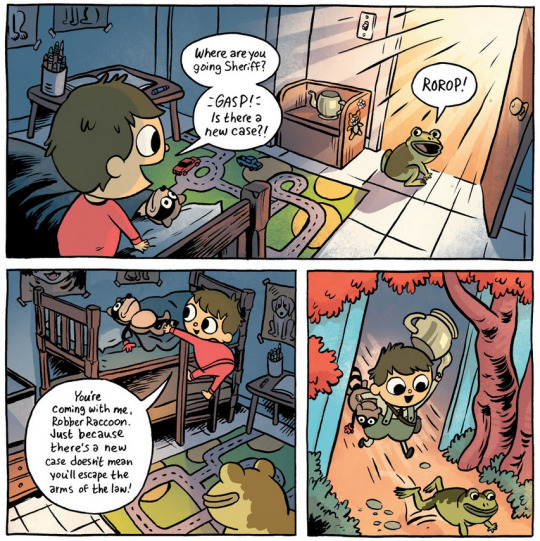
He briefly wakes up and goes back to sleep (probably because they wanted to show Wirt in issue 1.)
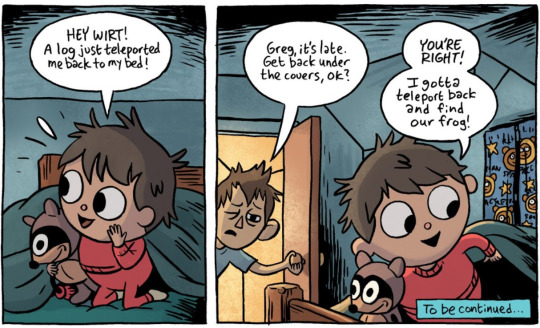
Greg doesn’t seem surprised to find himself in the Unknown; quite the opposite: Jason is telling him about a “new” case, implying that this has happened before, possibly multiple times. We have no idea how long after the series this takes place, only that it’s either fall or winter, judging from their pajamas.
Greg doesn’t offer us any other insight to what’s going on, but, eventually, Wirt shows up in issue 4. He asks Greg what he’s, and later they, are doing here, implying he did not choose to come and they don’t always come here at the same time.
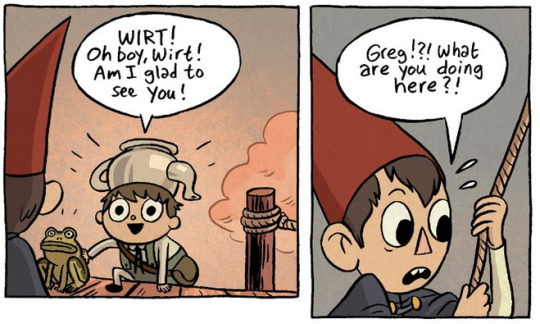
Wirt is particularly interesting that he seems to think they may not be able to leave again, as he brings up on 2 occasions.
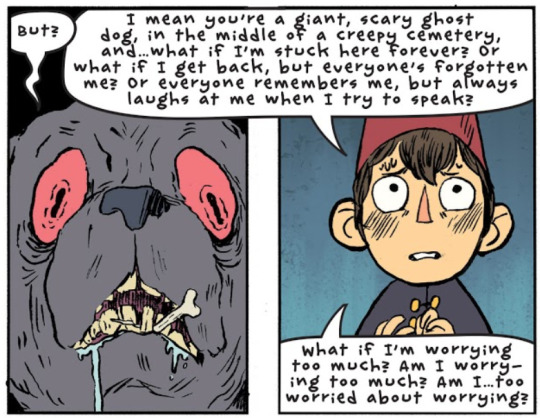

However, this may just be because he doesn’t know he’s dreaming.

(Yes, that’s Sara. More on her later.)
A detail that I think is important from the show here -- then, Wirt also couldn’t remember entering the Unknown, since he seemed to think he and Greg were lost and not, you know, drowning in a river. I think it’s very possible that when you enter the Unknown, you forget how you got there. Remembering that is key to being able to escape.
Sara tells Wirt he’s dreaming, and from that point on, he no longer waxes about being trapped: he instead tells Greg he wants to go home, as seen in issue 12.

When Greg and Wirt split up to solve the last mysteries:

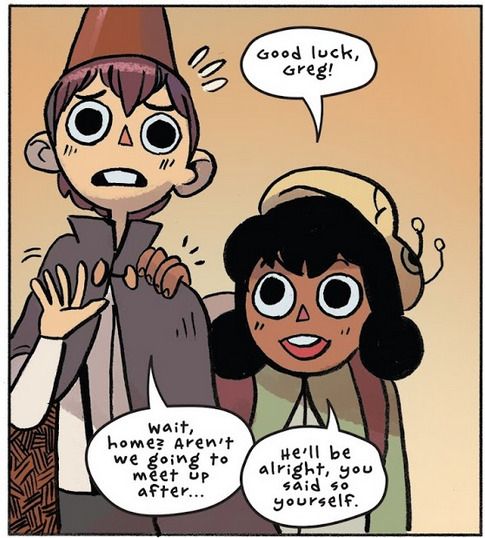
This implies that they don’t have to go home together and, at this point, they are more or less capable of going home whenever.
Issue 16 brings them both home, Greg after revealing Hero Frog’s intentions and getting Jason elected mayor:
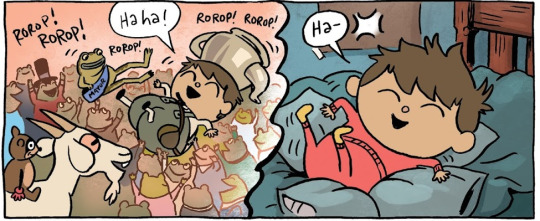
And Wirt after he and Sara defeat the Shapeshifter.
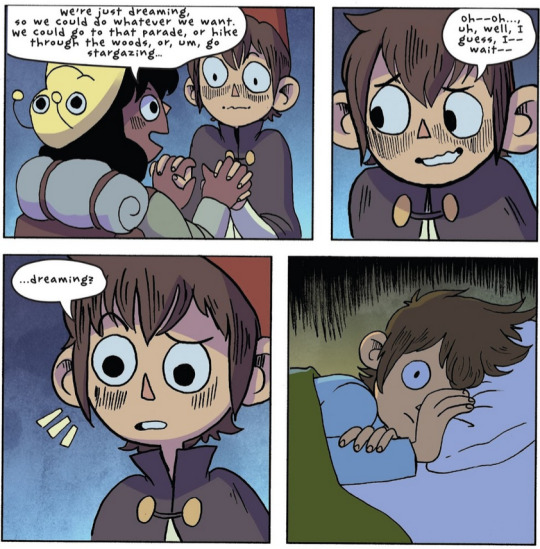
(poor wirt lmao)
I think these puzzle pieces can lead to a conclusion: They can only go home from the Dream Unknown once they are both aware that they are dreaming and they solve whatever problem they were brought here for. Once they do, they can go back whenever they want.
After waking up, Greg immediately checks on his brother.
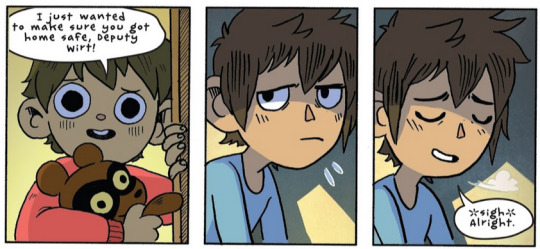
Solidifying that they remember what happened, and, implying at least, that they don’t always get home at the same time. I can see scenarios where one sits in the other’s room, waiting for them to wake up...
We ultimately don’t know how often this happens, what triggers it, and how aware they are of the whole thing. Judging from their reactions to being there and going home, I feel like this sort of thing happens often enough, but not so often that it’s exhausting and/or terrifying... once a month, maybe?
If that rate increases, though... well, that’s just some fun fanfiction fuel.
Some other observations:
1. Greg and Wirt may not experience things exactly the same in the Dream Unknown.
When Wirt first shows up, he makes this comment:
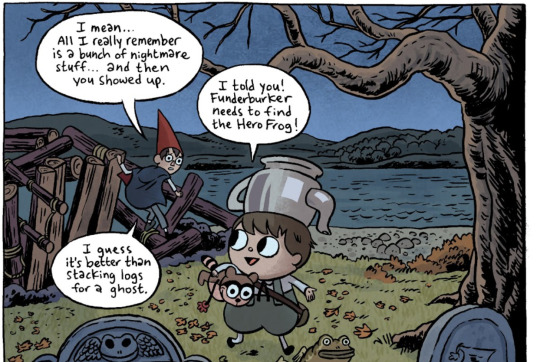
“A bunch of nightmare stuff” seems a little... extreme, for what Wirt was doing, as said ghost was a beaver in a sheet.

Issue 6 offers a potential explanation. The framing device for this issue is a tavern keeper asks them why they look so tired, and Greg and Wirt both tell the story of having to sit in a location all night to meet someone, but their stories vary wildly. For Greg, they were on a stage. For Wirt, they were in a graveyard.

Both stories have seriously different levels of Wirt’s enthusiasm,
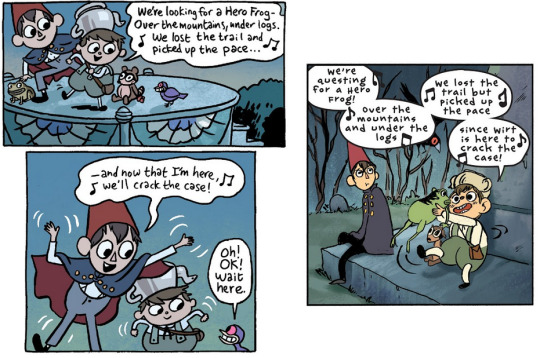
and how creepy it is.
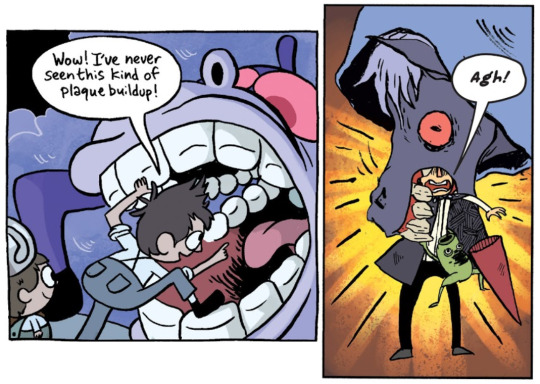
I won’t pretend that this is canon that they’re experiencing it differently; it’s definitely possible that one or both of them are unreliable narrators. Certain details, like Wirt singing, point more to that, but others, like Wirt getting eaten by a demon horse, is... a lot more extreme, haha.
This is also partly refuted later in the comic, as Greg and Wirt get separated but visit the same places, which are largely the same.
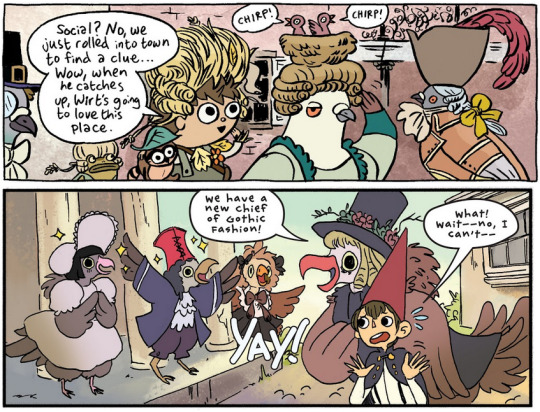
But still, it’s a fun idea.
2. Sara is here
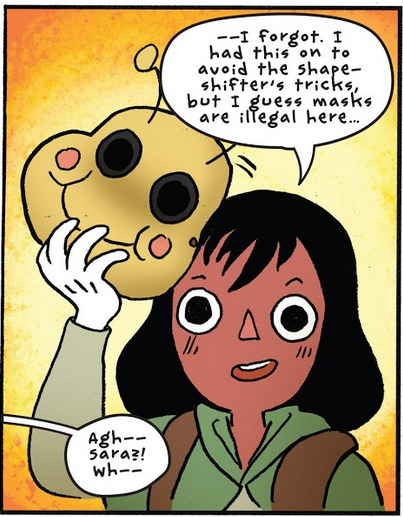
Yeah, so, this can either be adorable or terrifying.
All Sara really says about her being here is that she thinks this is a lucid dream where Wirt is a person in it, which Wirt never presses her but come on Wirt please press her cause what the fuuuuuuckkkkk????? Sara ultimately doesn’t seem to know what the Unknown really is, since she only refers to it as a lucid dream.
Three explanations I can think of:
1. Her line “I’m having a lucid dream and you’re a part of it” could be meant to imply that the opposite: Wirt is the one having the dream and has dreamed up a Sara to adventure with him.This Sara is just something Wirt has created to join him in the Unknown, and the real Sara isn’t involved or aware of this at all. This isn’t the first time the Unknown has created a Sara, if you consider Distillatoria canon (which... ehhhhh...... I have Opinions about that lol)
2. Sara has been to the Unknown before. If that is the case, it either happened recently, since Wirt is surprised to see her there, or Sara has been doing this for a while and they just haven’t run into each other. Her saying it’s just a dream isn’t incorrect, and if she doesn’t think Wirt is really Wirt (that the Unknown created him), there’s no reason for her to be like “hey, we’re in a dream recreation of purgatory that apparently has a grasp on my soul for all eternity.”
3. This is the first time Sara has been to the Unknown, and Wirt unintentionally brought her along. This one has the least evidence towards it, but I think it’s interesting. Greg is able to bring his stuffed raccoon with him to the Unknown, so why can’t Wirt bring the consciousness of his crush and/or girlfriend?
Another thing to think about when considering this: Wirt and Greg are in the Unknown in their Halloween costumes. I like the idea that whatever you wore to the Unknown when you go is what you always wear when you’re there. Sara is all dressed for an adventure, with a cute green cape, a huge backpack, and a bee mask (specifically to trick the shapeshifter).
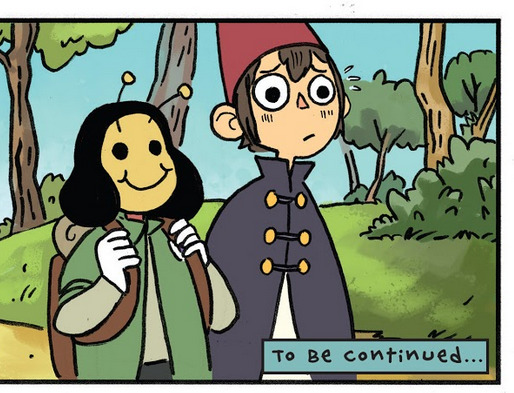
So I’m not sure what she might have been doing to be wearing this and then end up in the Unknown... Either she’s into LARP, she got into a hiking accident while wearing a sick cape, she changed clothes after arriving in the Dream Unknown, or her outfit is part of Wirt’s dream.
No idea which explanation is “correct;” I think they’re all interesting to play with!
3. Jason has relatives in the Unknown
Apparently the Hero Frog is Jason’s dad???

Which is... fascinating, considering they found Jason before going into the Unknown.
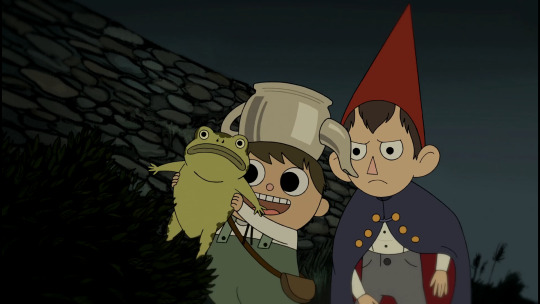
I think I read ages ago a theory that Jason is originally from the Unknown and got out somehow, as he is a lot more intelligent than a real frog should be. Who knows, though.
It’s probably also of note that Jason is the one who instigates them entering the Unknown, “telling” Greg there’s a mystery to solve.
4. Multiple days pass by in the dream
This is “fun...”
Day 1: Issue 1 (Greg’s arrival) - Issue 4 (Wirt’s arrival, diverging story)
Day 2: Issue 6 (morning after diverging tale) - Issue 7 (Greg sneaks around bird town, Wirt encounters a ghost)
Day 3: Issue 9 (Greg goes over a mountain. There’s a very fast day-night cycle here, but I think it’s for comedic effect. Wirt arrives in bird town and meets up with Sara.) - Issue 11 (Greg joins some “highwaymen”) /12 (Wirt and Sara help a sick goose)
Day 4: Issue 12 (Greg, Wirt, and Sara meet up in frog town) - Issue 14 (Greg spies on Hero Frog, Wirt and Sara get taken by an orphanage)
Day 5: Issue 15 (Greg/Wirt/Sara make their plan, Greg goes home before nightfall in 16) - Issue 16 (Wirt and Sara defeat the shapeshifter)
This is 5 full days they spend in the dream. Some of them are a lot fewer events than would happen in a day, and it’s very likely time is moving faster in the dream, but... jeez. That’s got to screw with your mind if this happens too often. Like, imagine the worst case scenario where they go to the Unknown every night and spend 5 days there every time! I doubt this is the case, but holy shit.
5. Beatrice, the Woodsman, Lorna, and the Beast are nowhere to be seen
This is more of an observation, but there is not even a passing mention of any of these three. Either they were all checked in on their first dream adventure, or they can’t remember that first adventure while in the dream too clearly...
There’s a ton of fun theories that you can make out of the Dream Unknown. Is the Dream Unknown the same as the Halloween Unknown? Are the boys souls claimed by the Unknown forever? Will it keep calling them back, night after night, until they go back permanently? How does this effect their healing from their trauma? Are these dreams going to increase or decrease in frequency? Do they always last exactly one night? Can Wirt fall asleep in class, spend a week in the Unknown, and wake up before the end of the period? Can Greg go to bed for the night and not wake up all day, but only have been in the Unknown for a few minutes? Does time pass in the Unknown without them there? In the Dream Unknown, will they always be the age that they originally were when they entered the Unknown? Does anyone else in the Unknown do this? (at some point, I want to do a theory post about who is from the Unknown and who is from the “real” world...)
Anyway... this post completely ran away with me. Hope you enjoyed! Send me your theories; I’m itching to hear them!
#over the garden wall#otgw#jeez this ended up really long#there was just a lot to talk about haha#mary blabs
72 notes
·
View notes
Text
Dark Cybertron Chapter 1: Welcome to Comic Event Hell
You know what readers love? When the stories they’ve gotten invested in over the course of a couple years get interrupted for some pseudo-crossover bullshit.
And you know what writers love? When the story they’ve been crafting over the course of a couple years get interrupted for some pseudo-crossover bullshit.
Did I say love?
Because I didn’t mean it.


“Dark Cybertron” was penned by John Barber and James Roberts, with collaboration with comic writer and artist Phil Jimenez, and was published from early November, 2013 to late March, 2014. Atilio Rojo, James Raiz, and Livio Ramondelli did the art, each responsible for scenes in specific locations, with Robert Gill filling in as needed. Alex Milne, Andrew Griffith, and Brendan Cahill would also contribute pencils to the first issue and the back half of the series. It was a celebration of the 30th anniversary of the franchise, and the second birthday of Phase Two... which went on for over four months, but never mind that!
Both "Dark Cybertron” and its preliminary materials were made to go alongside the Transformers: Generations toy-line, each issue being included as a toy pack-in with whatever character was being featured… or, at least, that was the plan. Sometimes it didn’t work out. Regardless, this storyline was created to sell toys directly, as opposed to the MTMTE/RID series being made to sell toys more through the power of suggestion. It’s a small distinction, but important, because it will help explain any lack of soul one may perceive while they read “Dark Cybertron”.
“But Hannz!” you cry out, reaching to grab me by the throat and shake me like a rag doll, because to you I’m merely a faceless voice on the internet. “Surely by calling this specific storyline soulless, you’re completely ignoring the very nature of this franchise that you’re almost uncomfortably invested in!”
To which I’ll say this: look, I’m pretty realistic about where my giant space robots came from; Transformers as a franchise would not exist the way it does without Ronald Reagan introducing the Free Market to literal children and fucking up how we interact with media for the rest of time. There is no ethical consumption under capitalism, and that rings especially true when I’ve got a Spinister on my bookshelf staring me down as I write this, that was likely made out of plastics which either involved blood oil or unethical labor practices, if not both.
However!
The choices of a company to have their comic license holders to cook up an entire plot that derails what they’ve already got planned out for toy tie-in comics is a completely different animal than what IDW had had going on up to this point. Phase Two had been about exploring different ideas that hadn’t been able to be explored during the war, and seeing what happens when you take away a third of the logline for Transformers G1 as a whole. Being a part of a brand of toys was almost inconsequential to how the stories were being told; even the Spotlights, which were also toy tie-in comics, had plenty of charm to them, if only because there weren’t quite as many constraints placed on the writers, and they were stand-alone issues.
Of course, being tie-in comics isn’t the only reason that “Dark Cybertron” is a bit of a slog, considering everything IDW itself was trying to get done within this storyline, but we’ll cover the publishing company’s/Simon Furman’s/Transformers’ tumultuous relationship with the concept of gender identity and expression later on, when it becomes relevant to the story proper. This point also ties into the interesting origin of Windblade, who we’ll meet in a few issues, and what happens when you let your fanbase have a taste of power and forget that people might like to see themselves represented in the media they consume.
“Dark Cybertron” is what ended up making me stop reading MTMTE the first time I tried it in 2015. A big part of it was because it forced the reader to need so much information from RID and even events prior to Phase Two, it wasn’t very fun to try to parse what was going on, on top of the writing beginning to flag because of obvious constraints to what Barber and Roberts could actually do, both within their deadlines and the rules put in place by their higher ups for the event.
“Dark Cybertron” is the result of the sort of executive meddling that kills reader enjoyment by requiring writers to cram their two worlds together as quickly as possible, without the option to go for nuance because there simply isn’t time. The reason we have four separate artists for the front half of this story is because Milne and Griffith didn’t have time to draw both their current workload and “Dark Cybertron” at the same time... but sales probably went up due to the nature of how the story was published, so I’m sure they didn’t really see a problem with it.
That’s a general “they”, not a Milne and Griffith “they”.
In short, we’ve got license contract obligations, fan-poll obligations, and gender stuff fighting for space within the next 12 issues, which will be published in the span of roughly four months. Things are probably going to be a little bloated and sloppy.
Regardless of any of these points, this is what we’ve got. It’s not like it’s all bad- “Dark Cybertron” has the benefit of being written by two people who had been working closely before it had even been conceptualized. Barber was the senior editor for MTMTE, and IDW as a whole until he left in 2016. It also isn’t a proper crossover- y’know, where two completely separate titles get mashed together for a bit. MTMTE and RID exist in the same universe, just have their own things going on, so a decent amount of things still carry over without you needing to have read every single thing in both. The writing, while not quite up to par with pieces that had more creative freedom and breathing room between scenes, is still recognizable as being Barber and Roberts’. Their voices are still here, they’re just strained under the weight of everything that has to be said inside of 12 issues.
With all THAT out of the way, let’s dive in to Dark Dawn: Dark Cybertron Chapter 1.
We get a quick rundown of the most basic information you’ll need for this entire story to make sense, as we reintroduce the fact that Shockwave is an ecoterrorist with more agendas than a daily planner factory on meth, and also that he grows magic crystals. I don’t care what he says, the Ores are fucking space-magic. If you don’t want to read through all of RID for everything else, please see Robots in Disguise (2012), #1-22- A Recap, For Reference Purposes. We also get a quick rundown of the Lost Lighters’ deal, as Swerve potentially has a meta-episode.

Be careful what you fucking wish for, bucko.
Our story proper starts with a flashback to the shittiest road trip Cyclonus ever went on, as the Ark 1 finds itself at the edge of a mysterious portal. This is likely why he wasn’t super thrilled when the portal to Luna 1 showed up- portals are probably a touchy subject for him.

Jhiaxus doesn’t know what this portal is- surely this means that science has failed us, and it’s time to call in the religious crowd to try and suss out what’s going on here.

It’s moments like this that make me wonder what exactly happened in the Dead Universe that made Cyclonus’ cheek meat just pack up and leave.
Now, we know that Cyclonus is correct here, because we as readers have more knowledge than the characters at this point, but Jhiaxus tries to write off this theory as hogwash, because he is a man of rationality and science. This is a slight removal from his character in the present, whose most notable traits seem to be a lack of ethics and screaming.
Everyone here seems to be slightly different from their current iterations, actually; Galvatron doesn’t say a word as he steps between Jhiaxus and Cyclonus, only using his body to communicate that the scientist might want to back off. Cyclonus himself is certainly the wordiest we’ve ever seen him to be, droning on through his actual thought process before he comes to a conclusion on what exactly they’ve found. Compare this to the Cyclonus of today, who only deigns to grace everyone with his voice if they outright threaten him, have something he wants, or are Tailgate. If he were to ever pull this verbal meandering on board the Lost Light, people would probably assume he’s having a stroke.
Nova Prime- you remember him, don’t you?- gives not a fuck about the Dead Universe, only what it means for him personally. And what it means for him is more locations to subjugate, because he is cartoonishly evil. His character is the least removed from his present-day iteration out of everyone. He tells the crew they’ll be getting a little closer, only for the portal to do the work for them, by way of dark energy tentacles.
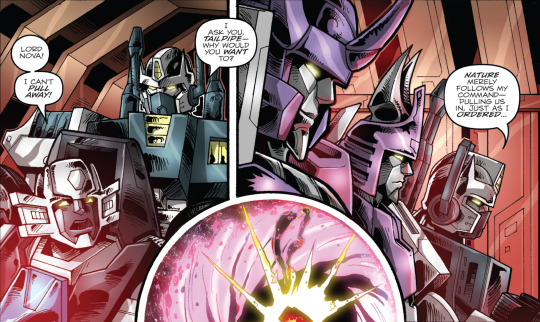
Wow, the pilot for the Ark 1 really is just straight-up named Butt, isn’t he? And what the fuck is that face you’re making, Cyclonus? Are you- oh my god, are you emoting? Oh my god, he’s emoting.
As the Ark 1 is pulled to its doom, Jhiaxus makes a quick phone call to Shockwave to tell him he’s his favorite, and to keep up the good work.
In the present, Shockwave reflects on just how friggin’ long this whole ordeal has taken. Fortunately, Waspinator and the Titan are almost here, and he can hardly wait.
Not, uh, that he’s got emotions or anything. It’s been established that he doesn’t have those anymore. Is impatience an emotion? Does that count?
Shockwave seems like he’d be really frustrating to write for.
Anyway, the Titan shows up, the Ore inside him and the Ore in the underground Crystal City combine, and the Titan starts screaming because everything hurts. Shockwave’s about as thrilled as he can be about the situation, given his lack of emotions.
Above Crystal City, we finally get back to that nonsense about the early sunrise, as someone- maybe Starscream, given the color of the narration box- waxes poetic on the planet of Cybertron, wartorn and wild in its rebirth, ruled by paranoia that has nothing to bounce off of, and so creates its own walls.
Then we get a detailed shot of Rattrap’s mug, and the moment is broken.
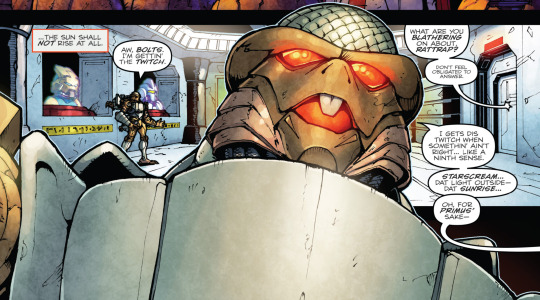
Rattrap’s character is a lot of fun in everything he gets tossed into, but you’re a goddamn liar if you think he’s pretty to look at. You are lying to yourself, and I won’t apologize for saying it.
Starscream walks out of his room in his hot new body, feeling fine and ready to take on the world. We’ll check in on him later in the day to see how that positive mentality is working out for him.
So, the sun hasn’t moved, and it’s way too early for the sun to even be up right now. That’s weird. Because I guess he didn’t know how the sun works, Starscream’s only just realized that this is perhaps a problem. He does some computer work and realizes that this is indeed a very bad thing, and asks that Rattrap call the Autobots. Not the ones who fucked off into the wilderness, the other ones. The gay, space ones.
Up in space, Orion Pax and his pals have found themselves in dire straits, the collapsing Gorlam Prime sucking their ship back down as the Death Ore consumes everything.

That’s not how engines work! And I think it really says something about the “Prelude” issues that I completely forgot why Wheelie was down an arm for a solid five seconds.
It turns out that Orion was the narrator the entire time, which I should have known- since when is the once and future Optimus Prime not the primary voice in any media he appears in?
It’s looking rough for the fellas, but luckily we’ve got to get the plot rolling, so the Lost Light VZZZZTs into existence and picks up the Skyroller to place it gently into its belly.
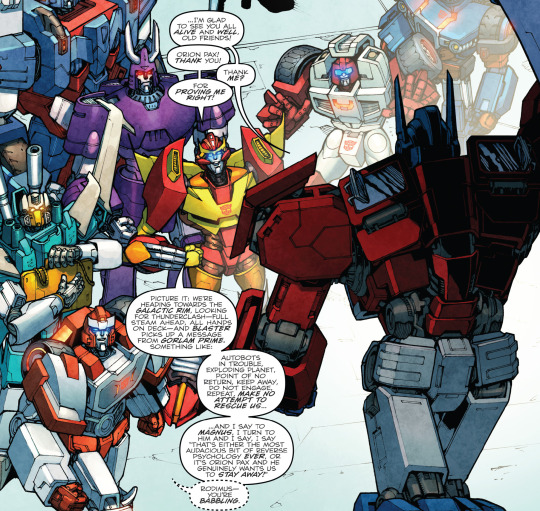
Orion isn’t exactly jazzed about the fact that Rodimus didn’t listen to what he told him, not even bothering to thank the guy for saving his life. I say y’all keep going on your Thunderclash Quest and leave this ungrateful loser behind. No space yachting for you, Orion.
The rest of the Pax Posse enter the Lost Light proper, and Hardhead reveals that he nearly joined the Quest, before he saw who all would be coming with, while Garnak has a tearful reunion with Rodimus. The fact that he’s calling him Sir- which I don’t recall him doing in Transformers (2009), at least not in a way that seems reminiscent of an unfortunate Antebellum Period Romance- feels rather weird, but I’m glad someone’s fucking happy to see Rodimus at least.
Ultra Magnus asks Orion if he’ll be assuming command of the vessel, as Rodimus tries not to look horrified by the thought alone, but fortunately Orion’s not going to pull his “I’m Optimus Prime and I Can Do What I Want” Card just yet.
Smash cut to the bridge, as Rodimus tries to make himself sound competent, when Starscream calls. Orion doesn’t like that Starscream has their number, Perceptor almost reveals the fact that this ship technically doesn’t belong to a faction, likely due to being purchased after the war, and Cyclonus gets brought in for his professional opinion.
As it turns out, that early sunrise isn’t a sunrise at all, but a portal to the Dead Universe. This is a problem, because the Dead Universe really sucks, and you don’t want to go there, especially if you enjoy being alive. Orion seems more concerned about the fact that Starscream is ruling the planet, and Bumblebee is nowhere to be found.
Speaking of Bumblebee, he and all his camp buddies are psyching themselves up for a confrontation.

Swoop, please, this is hardly the time for crudeness.
The Dinobots, sick of Bumblebee’s dithering about, decide they’re going to fight the fucking sun and gear up. Prowl, though generally disliking their brand of problem-solving, does share his begrudging respect of their can-do attitude.
Their can-do attitude over fighting the fucking sun.
Then an earthquake happens and the ground rips open to reveal that Titan that Waspinator showed up with.
Shockwave takes over the narration at this point, and we get artsy, as we see events that haven’t transpired yet over musings on the nature of... time? Maybe? It would be in line with Roberts’ go-to topics, but honestly the whole thing’s kind of vague so I couldn’t give you a solid answer. Shockwave gets awfully introspective for a guy who shouldn’t care, I know that much. The point is, he is inevitable and is super good at logic and science.
Also, Nova Prime and Galvatron are back, which is cool, I guess. Not sure where Galvatron had gotten to exactly after the events of “Chaos”, but he’s back now, so it doesn’t matter too terribly much. Shockwave serves them, which we’ll probably get an explanation for at some point.
God, you can practically taste the desperation to pin all these plot points together before the entire thing implodes on itself.
#transformers#jro#dark cybertron#issue 1#maccadam#Hannzreads#overthinking about robots#incoming analysis#text post#long post#comic script writing
86 notes
·
View notes
Text
I want to say something about Klaus
I’ve been waiting a very long time to see this movie, and when I finally could I loved it to pieces. But the ending broke my heart- in more ways than one.
There will be no “tldr” here because my feelings about this film are too strong to let me minimalize what I have to say about it (but I might have to make a part 2 since this is pretty big). If you don’t agree with me, that’s fine, it’s okay, I don’t blame you. I won’t tell you you’re wrong, because in your own life you’re as obligated as ever to have an opinion of your own, correct or not. One other thing I want to say before I start rambling is that this will be messy. Also I do not- nor have ever- claimed to be a critic, and this is not a review. This is just a single person on the internet expressing their opinion, and for the love of all that is holy let’s keep it at that.
Foreword over, on to my pure thoughts. Oh, and spoiler alert for those who haven’t seen the movie yet. No matter what I think about it it’s definitely worth a watch, and going into this without seeing it will probably confuse some folks. Maybe.
Okay, since my main qualm is with the characters, let’s start with Alva. I like her. She’s not the generic “tough girl who don’t need no man” I was fully prepared to have shoved down my throat. She has some genuinely good moments on her own as well as funny and pleasant interactions with both Jesper and the children of the town and is a fine character. She is jaded and determined, though not to the point of that being her entire personality, and I loved watching her find happiness as the teacher she wanted to be. She is a victim of circumstance that eventually has her environment changed and finds herself changed with it for the better. Her design and personality were very pleasing (to me) to see as well.
However...
Why did she have to be the love interest? Just- why? What warranted her eventually desiring a relationship of any description when she was shown to be more devoted to her position as a teacher- and as a single woman- throughout 90% of the film? This is especially frustrating since it turns almost every scene with her into one that involves Jesper in some way rather than build her as a character outside of this perspective. It takes away from Alva “the character” and instead focuses more on her as Alva “the love interest”. In media stuffed to the rafters in heteronormative relationships, and from those that I’ve seen, as afraid as I was to see it happen I was also prepared to have this aspect of the movie gracelessly thrown into my face. So, as might be expected, I actually groaned out loud when I saw it come to pass. I’m not mad, just... actually that’s a lie I am rather irritated by it, but also just... sad. Very, very sad. Disappointed, you might say. She and Jesper don’t have a lot of interactions showing that this was the obvious outcome. The best I can think that people would draw this conclusion would be a) she’s a woman and he’s a guy and they looked at each other that one time, and b) when he was trying to be charming to wriggle out of her wrath. Also, same scene, I don’t buy that it’s further implied by the boat-guy (I forget his name and can’t find it on IMDB) teasing Jesper over “young love” after she leaves in a huff. He’s not a reliable look into any feelings Jesper might feel towards her since all he’s done up to that point is tease him. It’s not enough, it just isn’t. Not to me.
In regards to her feelings for Jesper, the most I see from her is gratitude. The scene when she’s showing Jesper what he unintentionally did for the town is just that, and as she’s looking at the townsfolk Jesper looks... distressed. This is because he is conflicted about what to do at this point in the story, not necessarily because of any feelings for Alva, but it doesn’t even look like he’s thinking of her- romantically- at all. They don’t share any additional conversation, either; not a single flirtatious joke or anything that would lead me to believe they were bonding. I feel horribly conditioned to see her as the love interest and nothing more because that’s all I’ve ever seen done with a man and woman who only share a single line of dialogue before some narrator is telling me “of course” they got together in the end. Oftentimes, that line of dialogue is in an unpleasant or downright aggressive scenario, and that’s not romance. Seeing it happen over and over and over and over in almost every piece of media I subject myself to makes me want to take a blowtorch to my brain. I’m literally at my wit’s end. If it was more built-up and actually there, then fine, I take it back, but the thing is I hardly saw anything at all in terms of either Jesper or Alva or both of them thinking about each other, wanting to be together as more than just friends, throughout the entire hour and a half of the movie. The most scenes I can say they shared (not counting the ending because I’ll get to that in a bit) are four, with each one being little more than a minute long, two of them being more on the aggressive side, the third being when Alva shows Jesper the new Smeerenburg. Pleasant and humorous, yes, but not inherently romantic (neither of them share more than a glance and Jesper looks pretty preoccupied internally). The fourth is of Alva helping Margu translate what she wants from Klaus for Jesper. When Margu hugs Jesper and he and Alva exchange silent looks, the expression on Alva’s face, to me, says something like “you’re not half bad” and a note of good humor for how he handles children. Just so we’re clear I’m not against her finding happiness with Jesper. I just want it to be warranted. Not narrated.
Oh, but their love for each other is obvious and clearly meant to be from the start, is it? Okay then, show me when Alva says or does something and makes Jesper laugh, or vice-versa. Show me when she thought of him OUTSIDE of simply showing him what he did for everyone and how their hands touched, their gazes met and shy or flirtatious smiles spread across their faces as they drew slightly closer, and how she felt something more than gratitude and impressment for him. Show me when Jesper wanted to do something for her OUTSIDE being the means to a letter-related end. Show me the parts when they pined for each other and how happy seeing the other’s smile made them and how they were happy for each other’s progress and encouraged each other. Show me the parts of the movie where Jesper visited as often as he could manage to squeeze into his busy schedule just to chat. Show me kisses, hand-holding, lingering looks and happy little half-smiles cast from across a crowded courtyard. Maybe they do share something more than friendship, but no matter what I can’t get over how little there was between them to give me the impression it was going to lead to romance. It’s not even subtext, in my opinion.
Do you remember when Jesper’s father came back and it all came out in a part known as “the liar revealed” (a trope I quite hate for the oftentimes needless forced drama it creates, but whatever, for now I’ll let it slide) that he had ulterior motives which, at that point, he no longer had? Alva was the FIRST to turn her back on him in spite of their “lovey-dovey” merry-go-round painting MOMENTS earlier. She didn’t even want to hear out Jesper, who was clearly upset, and jumped straight to accusing him without showing that she was just as upset by the revelation that he could’ve been using her and playing with her feelings. How romantic. Meanwhile, the last one to return inside was Klaus, who was far more saddened and disappointed, leaving slower and leaving Jesper looking the worst, like he was heartbroken by his words- an echo of his own- most of all.
In fact...
Speaking of Klaus, I’d say Jesper is far more attracted to him than to Alva. This movie, while nearly devoid of interactions serving to build romantic chemistry between Jesper and Alva (which it absolutely should’ve if they had the ending be what it was), is littered with moments, wordless and otherwise, between Klaus and Jesper. So let’s go over them. I mean, if you’ve left by now then like I said at the start, I don’t mind. But if it’s alright I’d like to talk about them anyway, because holy holly I love them.
The scenes in question are clearly shown to develop their friendship and only get more romantic from there, and I could run out of breath trying to ramble them off all at once and what it meant to me to see them portrayed in such a beautiful way- artistically as well as in terms of the story.
Fairly early on, we learn that the wind is kind of its own “character”, guiding both Jesper and Klaus to ultimately meet each other as well as bringing them together more than once afterwards, and later on with what we learn about him it’s heavily implied to be the spirit of Klaus’ dearly departed wife. I’d like to think she was trying to tell Klaus to move on and find new love in Jesper and for Jesper to find purpose by Klaus’ side. The instances involving the wind are scattered throughout the film, so this is going to be a bit out of order.
To start, Jesper, while trying to get Klaus to donate his toys to the children of Smeerenburg, doesn’t notice the wind swirling around behind him like it was telling Klaus to follow him even if at the time Jesper’s intentions were selfish. Because he changes. They change each other, and their dynamic progresses so much more naturally, directly and clearly than Jesper and Alva’s.
There’s another scene when it leads Klaus to his workshop, where he opens the door to see a silhouette distinctly meant to parallel his wife- the one he loved- and revealed when he pulls back the cloth to be Jesper- his potential new love.

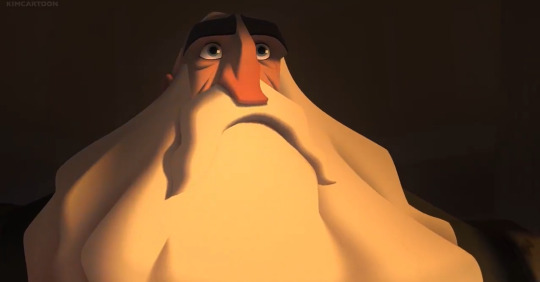


It’s one of the most explicit scenes enforcing my idea that Klaus’ wife was trying to get him to love again. Anyway, Jesper then excitedly starts going on about his gift and trying to get his mojo back before making an unintentionally big mistake by revealing a painful reminder of Klaus’ wife. A mistake he deeply regrets, mind. Not too long later, Jesper tries working on his own to make Margu’s wish for a boat/sleigh come true. While he works, the shot fades to see Klaus back at his workshop. He sees the picture Jesper drew of them and sighs, giving in and going to see him at the post office [also not to mention the drawing fades with the family shelf thing Klaus made so that’s pretty neat; took me a year to edit this in but hey better late than never]. My favorite scene is Klaus showing up to work on Margu’s present, giving Jesper a tool as well and interrupting Jesper to wordlessly point at the task at hand as if to say “If we work, we work together”. And that spoke to me. More than anything else in the movie and more than I’ve heard from any movie I’ve seen that I can remember. Also, Jesper’s soft, shy, willing smile put the biggest grin on my face. It was the last nail in the sled that made me convinced beyond a shadow of a doubt that they were forming a romantic bond from this moment forward.

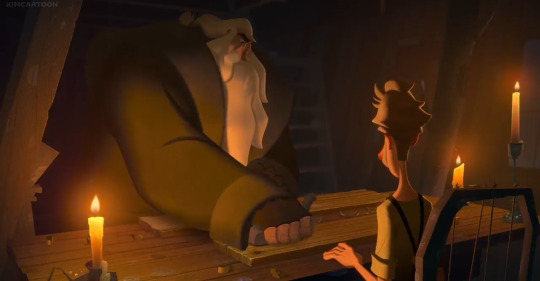
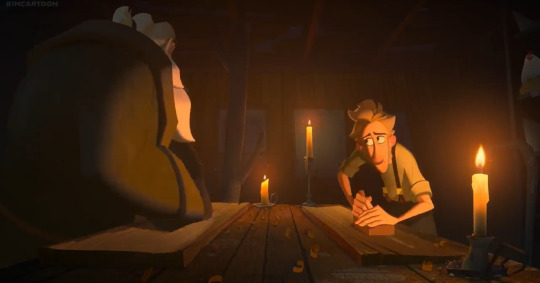



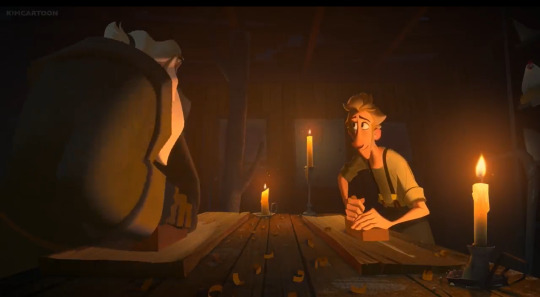
Part 2 because this is long:
https://flovey-dovey.tumblr.com/post/189133807093/part-2-of-my-thoughts-on-klaus
1K notes
·
View notes
Text
Health education and its importance (with reference to health education in pre schools)
Do you remember your life pre-covid? Do you remember when your children used to tell you different incidents and narrate stories to you when they came back from the day-care? Well, speaking on behalf of the entire staff and support staff at Ipsaa day-care, we too miss our children and having to share our moments of joy with them daily. Let’s all hope we see each other again soon in good health!
Talking about health, I am sure that as parents, most of you have guided your children towards the importance of washing hands. Whether it’s singing “happy birthday” during the hand wash routine or just talking to your child about the importance of washing hands, good health or health education is not only linked to washing hands: it also includes eating right, keeping yourself hydrated and exercise.
When a child comes to the center he/she is exposed to the world outside their home. The child must be on their feet and see for themselves what awaits them in their world called the “day-care”. As a pre-school; our topmost priority is making the day care healthy for the child to be in and to explore. In times like covid, it is imperative to plan ahead for our children and their futures in the day-care. Inculcating a routine in the center will not only make the child pick up the good habits first hand but also learning by doing. Good habits and cleanliness routines have always been a part of our curriculum. Now more than ever, we feel the base of all that we do in the center is cleanliness. A proper sanitized center that complies with all the health guidelines will never face difficulty in its functioning and as a result the children will be happy and safe. Currently, if we focus on the need of the hour then we will also come to a conclusion that we need to focus more on good health habits rather than just the teaching learning routine.
Let me point out a very important thing here, none of us are healthcare professionals but because we work in a field where we are responsible for our little ones, abiding by the correct norms is always seen as the most important step for us. When the children come back to the centers they will be told about the importance of staying healthy especially during these trying times. We must not forget that the children are too young so burdening them with excess information may also work in the reverse for us. At a primary level, the children coming to us in our centers spanning across India, should be treated with utmost responsibility and care. A curriculum that has all the important guidelines to leading a healthy life should be mentioned clearly and with defined principles for the teachers to teach the children. These children should be taught about the importance of health through different rhymes, stories and fun activities. As we all know that the children have hardly enjoyed any physical activities because they have been inside their homes for this long, we ,as a pre- school, must try to integrate health education with physical activities. By this I mean having the children engaged in different activities that will keep them busy and make them enjoy the day-care more. Sensitization begins at home. Since many of you parents are already doing this at home, we must take it forward from there in our centers. The right download for our teachers will work in the betterment of the children as well. Before, a specific and broad subject like health education was given importance but it was not the base of everything. Now, the teacher must take notice of the number of children who will play together, the toys they play with and the children to play with their own toys.
https://ipsaa.in/
1 note
·
View note
Text
The Character As A Tool: Why Your Fave Doesn't Get More Screentime
Please refer to this post
REMINDER THAT ALL VIEWS HERE ARE MERELY MY OWN OPINIONS
In truth, one of the most common complaints I see within this fandom is the treatment of side characters. Meaning, in short, a fair amount of the fandom are less connected to what’s going on with our main group of Nagisa, Karma, and Kayano, and instead relate to some of the less obvious choices. Now, there’s no problem with doing this. Hey, if you see something you like in a less important character, then absolutely go for it!
What We Do Know
I discovered for myself, whilst making my About Ass Class series posts, that absolutely some characters’ actual canon information is very dry. Matsui gives everyone a few bits here and there in both the Roll Call book and Graduation Album. If you’re lucky, there’s further points you can pick up just from watching/reading.
Now, and this I want to emphasise I’m stating as an opinion, Matsui actually gives us quite a lot to go from. Even if not every character is highly developed, there’s still a genuinely very solid starting block to go from with your own headcanon. Perhaps it can be argued that it’s not the reader’s job to supply that, but I’d counter that it’s actually kind of fun to not be fed every piece of information. Though more facts and a deeper dive into interpersonal relationships would be admittedly nice, I don’t think there’s anything wrong with us as a fandom coming up with those ideas on our own, using the pointers Matsui does give us as a starting point. Honestly it would take the fun out a little if there was too much information, and we’d have less possibilities to play with.
Why Certain Characters Exist
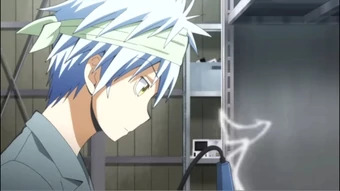
I’m sorry to tell you, but one of the first things you’re taught in any kind of writing or literature analysis class is that characters are not people, they’re tools. This may feel a little harsh to say, and I’m aware that many people get attached to characters and have genuine feelings towards them. And that is totally valid! Definitely not on the same scale, but I too enjoy when people have real emotions towards my OCs, so I get it.
(rest under cut)
To put it plainly: characters exist within a story as either a plot tool, or a message tool. A plot tool is someone who, as it sounds, exists to move the story along. Characters that need to exist in order for the story to happen as it does. Now, don’t get me wrong, you don’t need to have planned this out. You don’t need to specifically introduce Hara, for example, for the sole reason of her upping the stakes in the first Itona/Shiro arc. Characters existing for filler is still, in a way, a plot tool. It’s like… you set up a chess board. Sure, you might use the knight or the queen piece the most, but the pawns are still an important and useful piece, even if you don’t always utilize it for every move, or they don’t always stand out. Message tools are when a character doesn’t really do anything, but they help to assist in the message you want to send with your art/writing. There’s not so many examples of this in ass class, the best I can think of is either Yuuji or Sakura, who don’t do much at all but are beacons for what Matsui wants to say with them (which if you think about it is just ‘don’t do drugs kids’ and ‘stay in school’ :’)).
So free bit of writing advice for you: your character is your chisel. Once you’ve picked them up and started to work at carving out the story you want, then you can start adding all your fancy upgrades and personality points, which is what ultimately makes your character stronger. You grow attached to them when you’re done? Totally fair. Just… don’t go through this process the opposite way.
Without going too in depth with them right now, Nagisa Shiota is a plot tool. He is a plain easy to follow narrator whose observation skills intentionally mean the reader can see things clearly through his eyes. Where he loses relatability is when he displays his talent, but at that point he’s been so clearly introduced that it doesn’t matter as much, we can hear his voice. Him being more plain makes his talent more effective and shocking as it is. Karma Akabane is a plot tool. He exists so we have those somewhat comedic moments, and so we can have these big bad ass mental/physical fight moments. I actually think him not being the protagonist is something that makes Ass Class hugely stronger (and less cliché) as a series. Kayano Kaede is a plot tool. Admittedly, less so, but she has a lot of function as a back up to Nagisa, and then later is the catalyst for Korosensei’s backstory. The story starts to come to its climax due to her arc alone. As an aside I think a lot of criticism for Matsui isn’t that fair within the fandom, but I will openly say his treatment of her post reveal was not the best at all. He kind of lost control of what to do with her.
So, let’s talk about archetypes. I intend to write a whole meta about why Ass Class is predominantly written as a comedy series, but for now just take that statement as my opinion. Honestly, I do think Ass Class, with a few tweaks, could have worked with a bunch of unnamed characters. I’m instantly going to follow that up with: I’m very glad it didn’t. I love that it feels more like a large ensemble with a variety of characters. So instead of just plain filler, Matsui kind of makes good use of archetypes. You know, such as Takebayashi and Fuwa as otakus, Hazama as the dark occult girl etc. etc. All of this for comedic purpose, more than anything, which we really see in something like Koro Q which is more directly comedy. You might argue this is one dimensional, and I’d agree, but in this situation it’s achieving an effect. It’s genuinely better than having nothing. And honestly, they all do stuff. Some characters are far more effective and entertaining as a background character (i.e. Terasaka) than carrying a bunch of weight themselves.
Matsui Actually Does This Comparatively Well
Honestly, try and name another popular series in a classroom setting, with this many characters who all have individual personalities. Genuinely, the only one I can kind of think of is BNHA, and that’s not a fair comparison given the difference in story length. Comparatively to most series, Ass Class actually has really good side characters. If they were completely uncaringly written, nobody would stan them as hard. For the most part, I’d certainly argue everyone is memorable. Given that we’re juggling at least 30 people here (including teachers, Gakushuu etc.), I’d actually argue that’s kind of impressive.
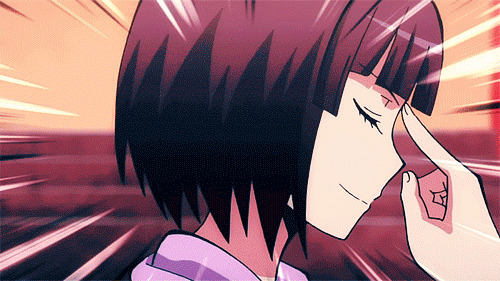
And the thing is, Matsui does care. He cares enough to give everyone designs, hobbies, and personalities. A good portion of them have an entire chapter to themselves, although relative to the story as a whole they might not do so much (example: Kimura). Matsui could have been lazy with it, but he was not. I don’t want to invalidate anyone’s feelings with this, but I do argue here that those who think the opposite might be a little wrapped up in the character they stan. And I can totally understand that rightfully, you want the character you love to have more screen time. However, just because you happened to fall in love with them (figuratively I mean), doesn’t change the purpose they were originally created to fulfil.
It’s an unfair criticism that not giving every single person a huge arc makes Matsui a poor writer. Honestly, if everyone was equal without a few main characters getting a greater amount of the attention, the entire series would be a hot mess. It might be fun to reimagine the series that way, and go ahead in your own time, but as a series from start to finish, as a first time consumer, it would be genuinely very hard to follow. Not without changing the entire structure and many many plot points.
I do intend to write more about this too at a later point (because I will admittedly need to do more research), but in my opinion the biggest issue with Ass Class, and the cause behind the problems I have with it, is the genuine lack of time. It’s a relatively short story, compared to a lot of manga, and thus there isn’t the space to contain everyone’s story in deep way. I’m absolutely certain, had there been 50/100 chapters more, every character would have had a stand out chapter to themselves.
So thus I bring up the fun and stimulation that is headcanon.
The Issue with headcanons
(this point will go much quicker, I promise)
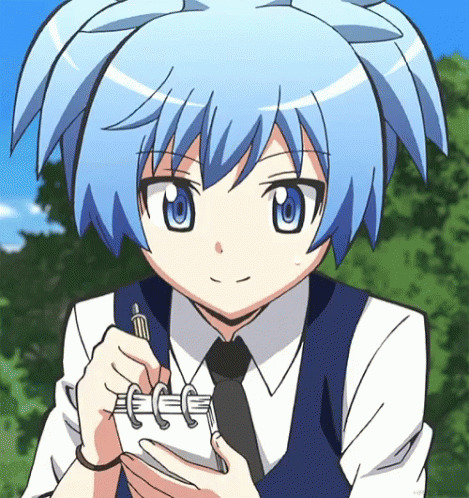
Ass class ended a looong time ago, let’s be fair. Whether you’re newer or older to the fandom, there’s still been quite a while since any kind of new content (Korotan D being the last official piece, Koro Q manga being the last anything, though I could be slightly wrong with that). That means, especially if you’ve cared about this series for a while, that we’ve considered the series to death.
Playing with headcanons is great! It’s fun! But, I do fear that especially when it comes to perhaps the more popular of the minor characters, a lot of us are getting wrapped up. It needs to be kept in mind that whilst these headcanons may have been around for a while, they are not directly correct to the source material. As a quick note, since I have seen people within the fandom getting kind of bothered over opposing opinions to the things they assume as canon. That’s not really anybody’s fault, but it does warrant saying, I think.
A Conclusion
Basically, loving a main character is great. Loving a more background character is great. You’re not a better or worse, more intelligent or more basic person for whoever your fave is. The point is, you see something you like in a character and you relate to them, or else just enjoy them. But as fun as that is, characters are tools. They exist for a specific purpose. Sometimes, that purpose doesn’t warrant them having a huge stand out character arc.
But hey, that’s totally okay because we’re fortunate enough to have such a community (arguably, I’d say a genuinely active one too) where we can dream that up ourselves. We can pretty much endlessly explore these possibilities. So, perhaps instead of negativity complaining about certain narrative issues we find (just putting this here: it’s fair to do this, but I don’t think it should be the FOCUS of conversation), we focus on driving that energy into creation. And there’s a lot to play with and create. And honestly, seeing HC posts and all sorts staring these more minor characters is great, and I’m pretty sure the majority would agree with me on that. I fully realise and accept that I have a platform here, and going forward I personally want to be a part of that. In a constructive way, rather than ‘deconstructing’ (yes, there’s a pretty big different as I see it).
(I realise that this last part comes off a bit call out post like, and I want to ensure that it is not intended to be that. I just have a general sense of some attitudes towards things floating around in a very generalised way right now)
88 notes
·
View notes